Writing a blog means changing someone’s life. How to start a blog is a very common question and practically very challenging, especially without guidance.
Writing a blog is not only typing words; it’s combining each word and shaping the future of the reader. If you follow any generic advice at this important stage, your site will vanish from search engines permanently.
Starting a blog is easier than before. Within a few clicks, your website will be live in front of the world, and you can build your personal or global brand with almost complete control in your hands.
In my 2500+ days of experience in blogging and content writing, I have succeeded and failed multiple times, bought 10+ domains, created multiple websites, and by doing practice, hit, and trial, I have discovered an evergreen, logical, systematic, and practical way to start a blog without facing burnout.
You can learn, understand, and implement everything systematically and logically from Day 1 of your journey. You can earn in Rupees, Dollars, Pounds, in short, multiple currencies.
On Day 1 only, your website will be live, fully functional, and ready by my method within 1-2 Hours – My 100% Promise & Guarantee.
The blog post will start like this:
- My Story
- Little Theory
- Practical Learning Starts From Brainstorming in Step 1 & Learn How to start a blog especially how to start a WordPress website
Table of Contents
My Short Blogging Journey – Continued In Every Step In Detail

You can directly jump to the Introduction section if you don’t like reading real, authentic, and honest storytelling content, but my story will be continued in a flow till the end of the blog post – it’s just the start. You will learn a lot from this story, you will make fewer mistakes than I did for sure, and I guarantee you this 100% 🙂
When I started my blogging journey, it was before the AI era, back in 2018 (I was 18 years old). It was difficult to find relevant content, write and produce content that attracts visitors consistently, and a lack of available resources and guidance cost me a lot of time and money in finding the right path.
It took me multiple years to figure out how the Blogging Industry actually works and how we can grow consistently.
I was publishing blogs randomly, without a strategy, even though some of my articles got ranked on the 1st page, 1st position of Google, but it was still not driving a lot of traffic because of my little to no knowledge about SEO and marketing.
I started searching useful resources online, even I have seen literally 1000s of videos + blogs + read multiple E-Books that claim “how to start a blog for beginners and make money online fast (100$/day), which is around 75-80 Pounds or Rs 8500+” but that never happened with me (they were all similar, copied and pasted, rephrased with affiliate links to earn even more money, and no added valued content).
My focus changed after looking at their content to like “focus on monetization & quantity, quality can be build overtime” but this didn’t helped me to make money but yes I learned something (I will discuss in multiple steps below), and here I was tired, exhausted, spend a lot of money, gave up for months writing blogs, but nothing happened.
Mostly the visitors were my family, friends, and 1-2 new visitors – probably some of you who tried blogging before can relate to this, right?
Important Tip: Don’t believe in Every Video or Blog Post You See, and don’t invest money without research; you’ll benefit in the long run. Never trust people blindly on the Internet.
Anyways, I continued blogging along with attending my college, other daily life tasks were there, I was facing burnout, and stress and then everybody started saying, blogging is gone, blogging is saturated, so don’t waste your time, many bloggers Quit blogging, but practically that was not true, I knew it, but how?
It’s because since I was writing consistently, eventually, after a few months, in 2019, I got my monetization enabled via AdSense, and I was getting traffic, but how? It’s called consistency, determination, discipline, and I spend some money to buy hosting. It’s important to invest at the right time.
Blogging is still one of the most lucrative ways to earn and make money online today.
I made my first income by ads (Google AdSense), selling my other domains (I will show you how later in the blog), and affiliate marketing.
I made multiple websites, some failed (I’ll show you how you still can earn from them), some passed – but they all helped me gain experience on what works, and what to avoid.
I will continue the story in detail down below, let’s jump to the theory + practical part now so that you can learn blogging, and don’t get bored, but read it completely, because if you miss even a single line of this blog post, forget you will be a blogger someday.
This is because: If you can’t even read this blog line-by-line patiently, how will you even have the patience to continue blogging consistently, and learn how to implement effective strategies if you don’t even have the patience to read a blog post? You also have to learn to read your competitors’ blog posts, maybe even I am your competitor, hence it’s important to read, okay, got it?
Do you know that 600 million blogs are already there in the internet, so how will you make an impact as a newcomer? How will you stand out from the competition?
It’s difficult without a strategy today in this world of AI. Let’s start your real journey from the Introduction and then Step 1.
Introduction On How To Start A Blog – My 2500+ Days Of Honest Experience
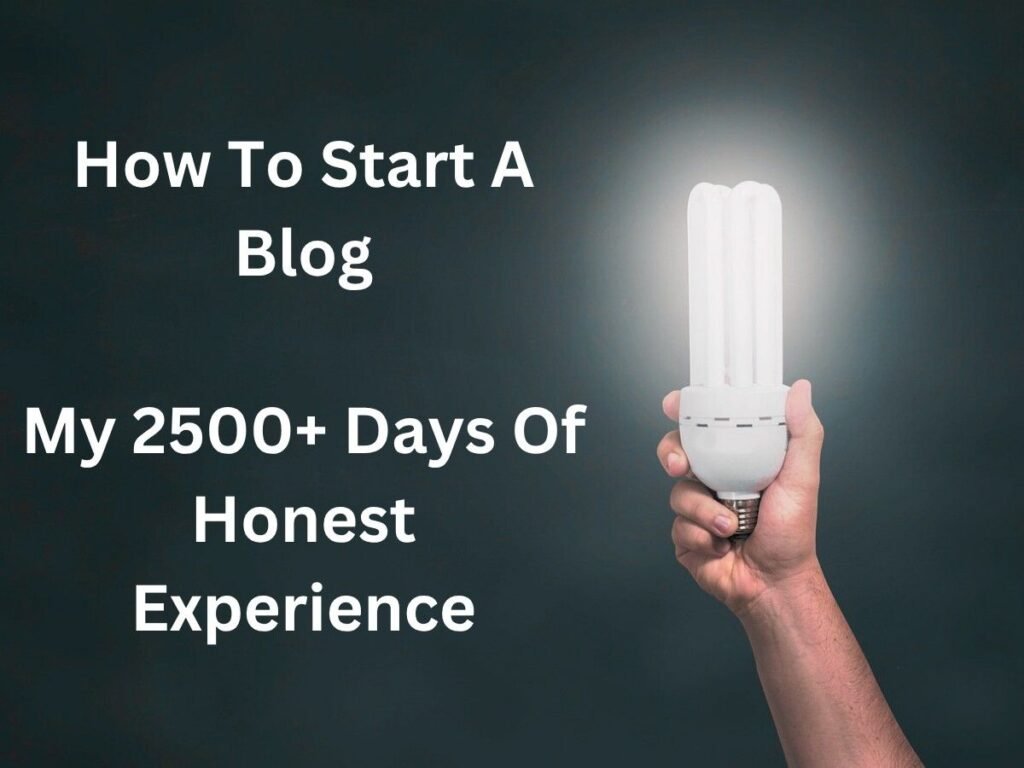
Having a Website, having an online presence is crucial for personal portfolios, startups, content creators, and even Global brands.
The story continues – After learning basics of blogging, I have worked with a new Startup and developed their website, I know how crucial it is for individuals and businesses to have a website today, build an online digital empire, it can give you employment, your dream job, adds to your resume, improves your credibility, establishes you as an authority in your expert area – This is because a website can be made on any niche or industry.
With my method, even a beginner will be able to build a website, write a blog, publish it, and even earn money, but yes, it will take some time, as per my experience, and never expect overnight results – straight practical fact 🙂
Many people claim you can start earning from Day-1 (especially through ads), and well, while it’s possible up to some extent based on the level of individuals experience, but as a beginner it will take you months, sometimes even years, to earn a little to no money, but after that consistency will pay you and provide you with your dream life.
Starting a blog website involves multiple workloads daily, consistently, and then a burnout, but I will also share how I overcame burnout and continue my blogging journey. You can apply the same method, too.
Step 1: Understanding Blogging, What Is a Blog & Then Brainstorming: The Practical Way
Let’s first start with the basics of blogging and understand why blogging is important and why it matters as of today.
But before we dive into brainstorming, let’s understand the concept of a blog and blogging.
What Is a Blog?
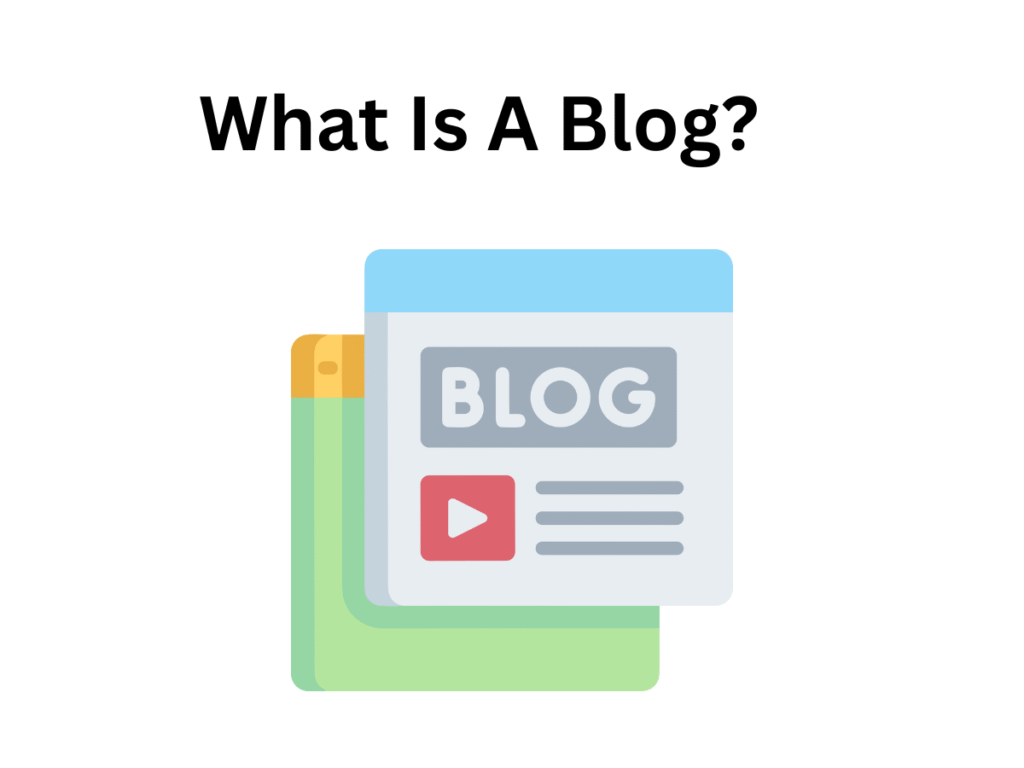
A blog is a part of a website or many times a complete website, which consists of relevant pieces of information, where content is regularly updated, articles are published, which is shared with the world online by providing knowledge, value and a perspective to the readers, and contains our thoughts, facts, and opinions about a particular topic, written for a particular audience, to inform, inspire, and engage the readers.
It is the part of your blog website that is updated often, frequently, to provide the latest information, and to keep your readers informed and engaged with your content. This builds authority.
A Blog is your digital identity and assists you in making an impact. Blogging can be formal and informal, mostly informal.
Many Businesses and companies, even content creators, use it for marketing, driving sales, and revenue.
In my 2500+ days of blogging experience, I have learned the core strategies and the most logical, practical way of how to start a blog. I promise I will not miss or bluff anything, and you will surely earn your first income sooner with honest guidance.
Whether you want to build your dream website for active or passive income, you cannot miss any step.
You may have a question in your mind like I had back before stating my blog website.
How Is A Blog Useful?
Well, it helps you to be relevant, and share something with the world to talk about, this way you will gain authority, credibility, trust, and experience, that can shape your career.
What Is The Purpose Of A Blog?
The purpose of a blog is to share authentic, relevant content with the readers, to keep them updated with the industry you talk about online, share your thoughts, opinions, and facts that help in community building, and in the long run, drive profits via SEO and marketing.
Who Is A Blogger?
A Blogger is someone who creates, publishes (optional), and manages content for a blog or a blog website consistently and is responsible for creating authentic, real, informative content for an audience who is looking for solutions for their pain points.
A blogger shares their experience, values, thoughts, facts, and opinions online and builds an online community where people can comment, interact, and write on their favorite topics.
Why Do Many Bloggers Fail?
Bloggers fail because of their lack of consistency, lack no clarity, never reach their potential audience, lack of SEO and content promotion, and over expectations within a shorter time period, and this is why bloggers quit, they think they will become a millionaire within short period, when that does not happen, their hopes are shattered and they quit.
Sometimes, I seriously don’t understand why do people stop blogging. It’s such an important skill to have in today’s world. It helps you build your online presence, build your portfolio, showcase your knowledge, provide value, and even earn money – what else do you seriously need?
What Exactly Does A Blogger Do?
Blogger uses the platform to share authentic, real facts, opinions, and expertise about a niche or topic with the world. This helps to solve readers’ problems, providing them a solution, and helping the planet.
They can craft blogs, videos, podcasts, infographics, and more to share on social media, driving audience, sales, and revenue in the long term by making an impact on society.
If you say, Who is considered a blogger? Well, then, someone who writes blogs on websites, journals online, especially about a niche, is a blogger in general.
Who Is Qualified To Be A Blogger?
Anyone who is willing to share their expertise on a topic and is pledging to help others with quality content, ensuring authenticity, honesty are considered qualified to be a blogger.
He/she must be creative and an excellent writer, but if you think you lack here, you can still start and improve with time.
The person must express properly, should have good research skills, and must be open to suggestions from their readers.
I know you have more questions, like where to write a blog, how to write a blog, how to make money online, but don’t worry, it’s covered in the later sections.
Now let’s understand the concept of what is blogging, the benefits of blogging, how it came into existence (History Of Blogging), and why it matters for individuals and businesses, i.e., why blogging is important.
We first need to understand basic theories, only then will you be able to apply them practically to get benefits, right? 🙂 – Don’t Panic, The Practical Section will begin soon! – If you don’t understand what you are applying for or doing, then it will be extremely hard for you to sustain in this Industry, just a little more patience 🙂
Many people changed their lives with blogging, they do full-time blogging, have complete control and freedom, no time constraints like a regular job, earn a lot, and are living their dream life – but it takes time, energy, and consistency, and understanding of basic concepts first. No need to rush 🙂
What Is Blogging?
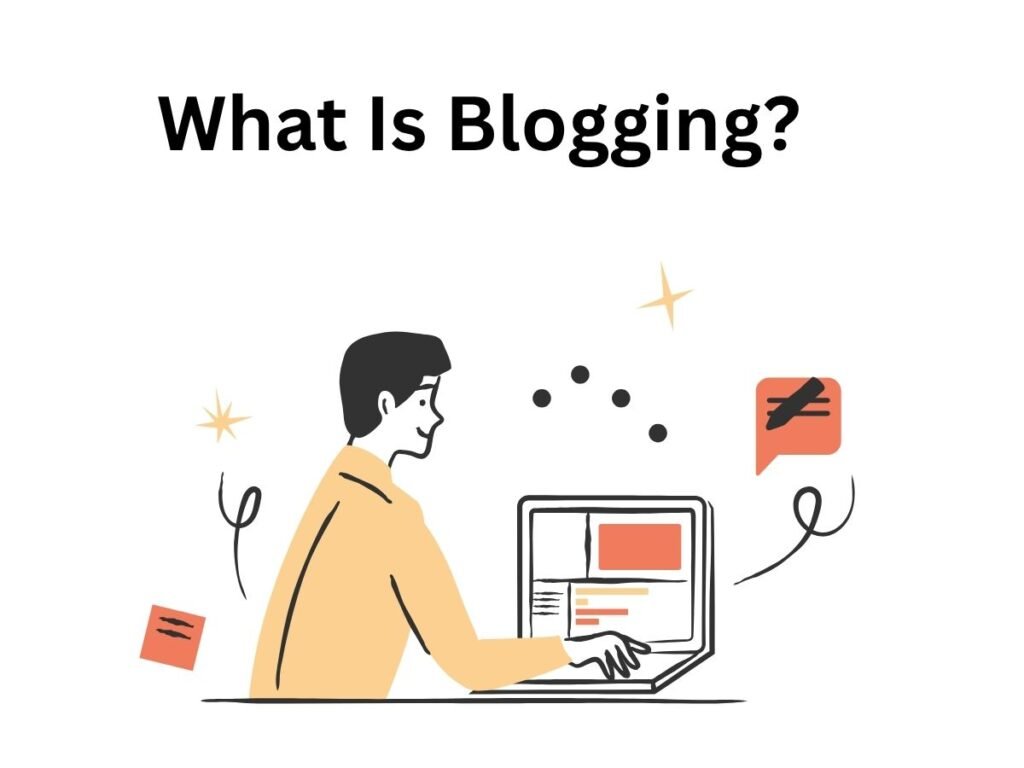
Blogging is the way to share your thoughts, opinions, ideas, and facts via building a website, creating, and publishing content online. It includes writing articles, maintaining your website, researching, and promoting content, sometimes even providing employment by hiring people, and supporting their lives.
It is like an online journal, and empire for individuals, and even for businesses.
Blogging helps us to build an online presence, brainstorm ideas, learning, and grow simultaneously, helps you to get a job, run your business, and even optimize for search engines to rank on top of the world online.
The length of a blog post is based on the relevancy of the topic, the search intent, and the industry, just like this blog post is a huge one, but it contains essential information.
Blogging and having a website are not a get-rich-quick scheme; it’s a long-term wealth that you grow with time. It is one of the best assets to have today.
What Are The Benefits Of Blogging?
There are multiple benefits of blogging, and it helps with the following:
1. Improving your writing skills, making you better at content writing
2. Helps you to focus on freelancing for clients by writing SEO-friendly blogs
3. To improve your creativity skills
4. Helps you connect with the world, hence improving connectivity and networking
5. Making a lot of money and supporting your life
6. You can showcase your blog website in your CV/Resume in your portfolio section, and even get a Job
7. Blogging helps you to gain experience, knowledge in your field/niche, and helps to improve your confidence and expression
8. Improving critical thinking, analysis, and thinking outside the box
9. Making an online presence
10. Building a personal or a global brand, impacting and improving the lives of others, and much more
Super Interesting History Of Blogging (Recommended To Read)
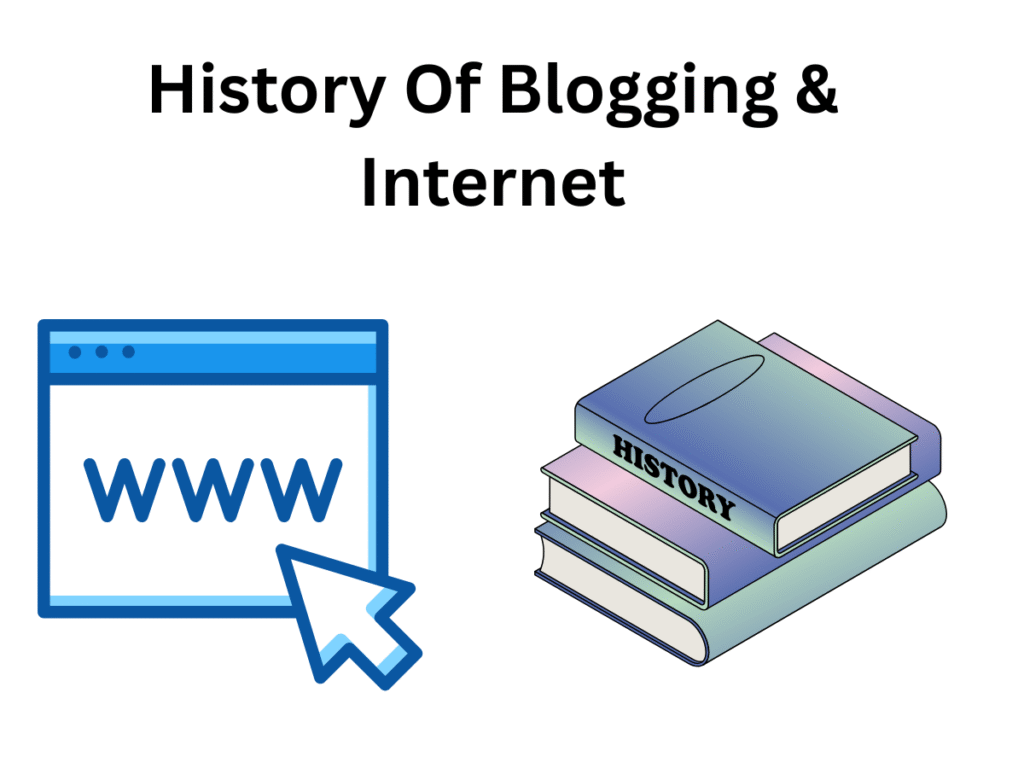
Blogging started in the 1990s after the birth of the Internet in 1983, and the world changed completely. This allowed us to connect with anyone from any part of the world at any time.
1968 – Launch Of ARPANET
In 1968, ARPANET was introduced to the world, which was the first operational computer network, and this laid the foundation of the modern internet world.
1969 – Distance Networking
In 1969, long-distance networking between the computers was achieved by an experiment between 2 research teams, and it was a stepping stone for a brighter future.
1971 – First E-Mail
This year, email was introduced to the world, and the first electronic mail was shared between 2 computers situated some feet apart from each other, and this changed the course of history, to share and publish information with each other and the world.
In the Email addresses, the initial Email introduced the symbol “@”.
1983 – Birth Of The Official/Modern Internet We Know Today
This is the year when the internet came into existence.
After ARPANET adopted the FCP/IP Protocol (which helps in dividing data into packets, furthermore, it routes them independently, and finally assembles them at the destination), that finally allowed different networks to connect seamlessly, and we started witnessing the interconnected network system, which is called the modern-day Internet.
The Internet finally became the network of networks, and Blogging didn’t come into existence in 1983, but was soon going to be born.
1985 – First Domains Were Registered
A domain name is the name/address of your website (we will cover it in detail below).
This year, you could have bought a domain name “For Free”. Yes, Domain names were free during this time; you could have registered some of the best names, even like Google (google.com), YouTube (youtube.com), for free 🙂
Symbolics.com was the first ever .com domain registered online on the internet.
Domain names help you make an identity online, give you your address, like your home.
1991 – Launch Of First Website
The first website came into existence on August 6, 1991, and it had a basic text page with words hyperlinked – explained world wide web projects and also the processes of how to create such pages with relevant information, and access information.
1994 – First Blog Was Written
The first blog was written on a personal website of links.net, and while it was not officially called a blog, it still laid a clear foundation and characteristics of a blog; it contained some amazing commentary, weblinks, and personal reflections.
1997 – WebLog
The term “weblog” was coined this year, and this led to the foundation of the modern-day term “blog”. It was coined to describe the personal websites and online journals that were updated regularly with new content.
1999 – Blog Came Into Existence
The word blogging came into existence this year, and to date it’s known as blog, and it’s actually the shorter term of weblog. Blogging since then has changed the course of the game.
Blog became famous. Many famous blogging platforms like Blogger came into existence and this led to the evolution of blogging.
2000-Present
Till today, blogging has evolved so many times, major Google core updates, new blogging platforms like WordPress became famous, are now dominating the market, till now blogging is a full-time career option for many around the globe, you can monetize through multiple streams, reach global audience and ear consistently, making an impact on everyone.
Why Blogging Is Important?
Blogging is extremely important to create an impact, improving your SEO rankings, driving traffic to get more sales, helping to establish authority in the industry, building a lifetime asset, improving your portfolio, experience, increasing awareness, promoting products, unlocking creativity and analytical skills, and creating a community online.
Even I am alive with blogging, and content writing, doing studies, and going to make it my full-time job/business soon 🙂
Many people ask 2 important questions here, which are always in demand.
Is Blogging Dead?
No, blogging is not dead; in fact, the blogging industry is booming and is highly profitable. It’s not going anywhere.
Blogging is still a demanding form to consume content, almost everyone reads blogs on the Internet, searches for something on Google, and other search engines to get information right?
Yes, the way we do blogging is evolving with the introduction of AI. You need to stop stuffing AI-filtered content and add a human touch, your experience + facts to rank better, higher, and earn a decent income. It’s not that easy anymore.
Is Blogging Profitable?
Blogging is extremely profitable, especially in the long term, and is highly valuable as it helps us to support our life, but it depends on:
1. Our Niche Selection plus staying relevant
2. Which income stream we choose – We can generate income through multiple streams like Ads, affiliate, sponsorships, and much more
3. The type of platform we interact with – Blogs, Integrates well with multiple platforms, and software like social media platforms, plugins, etc.
4. Our Honesty, Authenticity, Authority
5. High Demand = High Traffic = High Conversions = High Income
6. Brand Awareness
7. Level of Dedication, commitment & Efforts
Yes, it’s not a get-rich-quick scheme; it takes a good amount of time, effort, and energy, and income depends on the type of audience and niche you are interacting with, so choose what matters to you. Even as a hobby, it can be profitable to you.
Blogging is not for everyone, as it takes a lot of hard work and interest.
Many people on the Internet claim that blogging is dead, it’s saturated, but the truth is that the way you do blogging has changed.
Even if you want to try and test blogging as a hobby first, do it, but my first real recommendation is if you really have some budget, then invest your money; else, try the free platforms and understand how blogging works for 1-2 months before investing.
Brainstorming (First Practical Concept)
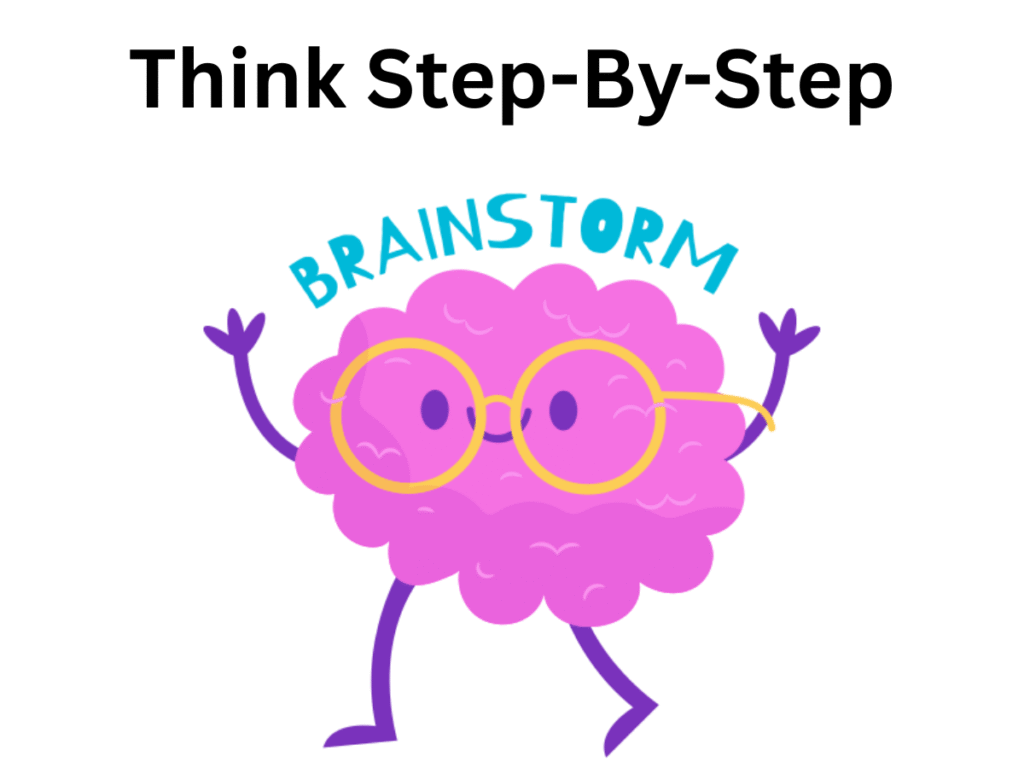
Now, after a little theoretical idea about blogging, in order to start your blogging journey, even before selecting a niche and a domain, you have to first brainstorm the following:
- What Is Your Expertise?
- Why do you want to start a blog?
- What Is Your Purpose?
- What Is Your Vision?
- What Do You Want To Achieve?
- Who Is Your Target Audience?
- Should I Blog Privately Or Publicly?
- What Will Be Your Tone Of Writing?
- Will You Share It With Family & Friends?
- Is It Going To Be My Hobby Or A Long Term Business?
- How Much Time Can I Dedicate Daily, Weekly & Consistently?
- Do You Want To Teach, Inspire, Share News, Or Entertain?
- Do I Want To Monetize My Blog?
- Do I have Money To Buy Hosting & Domain?
- Should I Invest In Premium Tools Initially?
- Should I Look At It As A Career Option?
You cannot skip answering these questions: It’s practically unrealistic and will seriously cost you a lot of time, money, energy and in the end you will give up and say blogging is fake, people lie for money, you must have a clear purpose, vision, and clarity.
If you really want to know how to start a blog for free, then even as a hobby, first you need to do brainstorming to achieve success.
Since you are reading this blog and cannot talk to me directly, I have written another section on how I would have done brainstorming. Read it will attention.
Important: I Did This Mistake Initially & Wasted A Lot Of Time, Energy & Money: If You Don’t Answer These 16 Questions, Never Move On To Step 2, Honest Advice, Read The Entire Blog For Now, But When Starting, Return To This Step 1 & Answer All The Questions.
Learn From My Practical Example!
It May Seem Boring To Answer These Questions, But A Clear Mind Wins The Race. Millions Of Blogs Are Published, Where Maximum Are Dumped & Never Found On The Internet, But Why? They didn’t answer these Questions, i.e., Lack Of Clarity.
Build Clarity, Discipline, and Create Your Empire!
My Practical Example Of Brainstorming (Advisable Not To Skip)
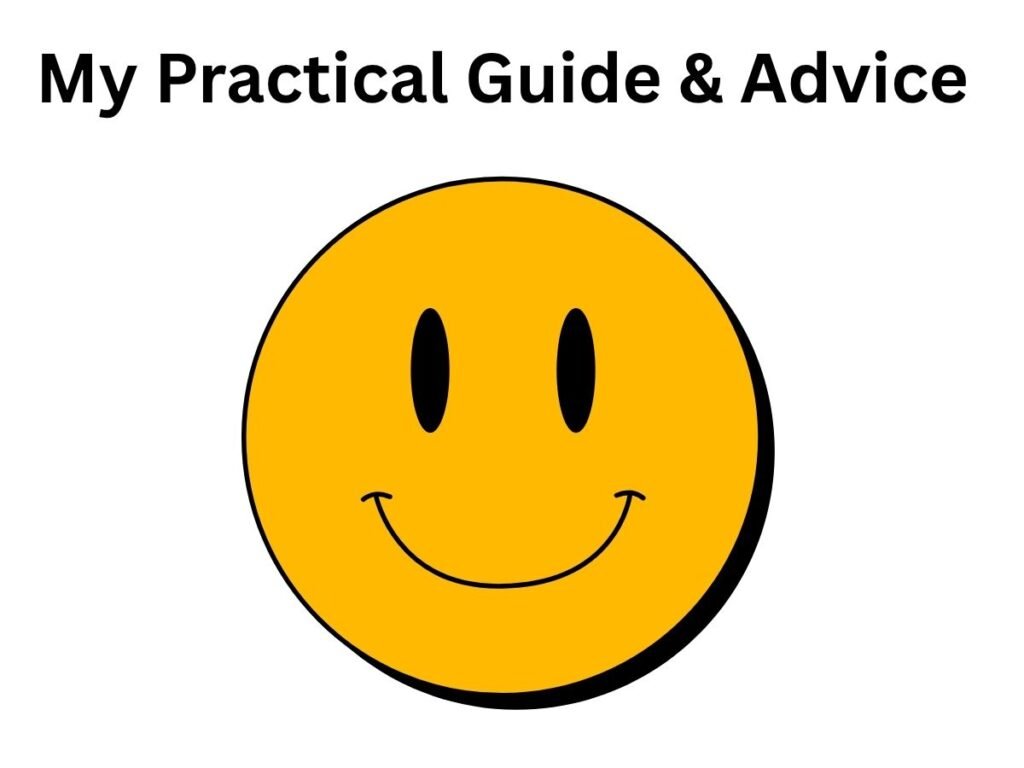
This Section Is Seriously Interesting & Helpful, If You Want To Become A Blogger 🙂
Question 1: What Is Your Expertise? Example: Well, in terms of my experience and expertise, I am a science student and I have some real knowledge in my domain, plus on various domains since I love to read and analyze different niches. But I don’t have any expertise in commerce or the humanities domain, right?
I do have a little Idea about some concepts, but now that much to teach or make an impact on the world.
So I have to choose something based on the science niche, right? Not Always.
See, it’s all about studies only, but there are extracurricular activities too, like playing outdoor games, doing yoga, reading books, painting, teaching, running, editing videos, etc. – I also love to talk about these topics.
If you really know any of the things you love, you can write about it.
Remember, it’s not always about having a degree only, it’s also about having a desire to know more, expertise can be built over time, if you have some good knowledge about something, you can write about it.
For now, after thinking for a long time, checking my books, looking at Google, searching websites and topics that whether people talk about them or not, I have made a final decision (it’s an example, remember)
For example, I choose to talk and write about my expertise area or niche (meaning any topic or an industry): Climate Change.
We will discuss more about niche in step 2 in detail, just gave you an idea of what it is in reality.
Now that I have clarity, I will answer the next question.
Question 2: Why do you want to start a blog?
Well, I want to start my blog because I feel that there is a lot of misinformation on the internet today about climate change.
Plus, I want to educate people and build an online community of like-minded individuals who can, with me, change the world by focusing on environmental challenges. I also want to earn passive income to support my work and with that, I can do something better for society. – It’s just an example, your reason can be different.
Now, the next Question no. 3: What Is Your Purpose?
My purpose is to educate the present and future generations that please don’t harm the environment, take necessary actions by unlocking knowledge about climate change and its potential threats.
From my website, you can know more about this world, and even collaborate with brands who are environment friendly, lets work together.
Question no.4: What Is Your Vision?
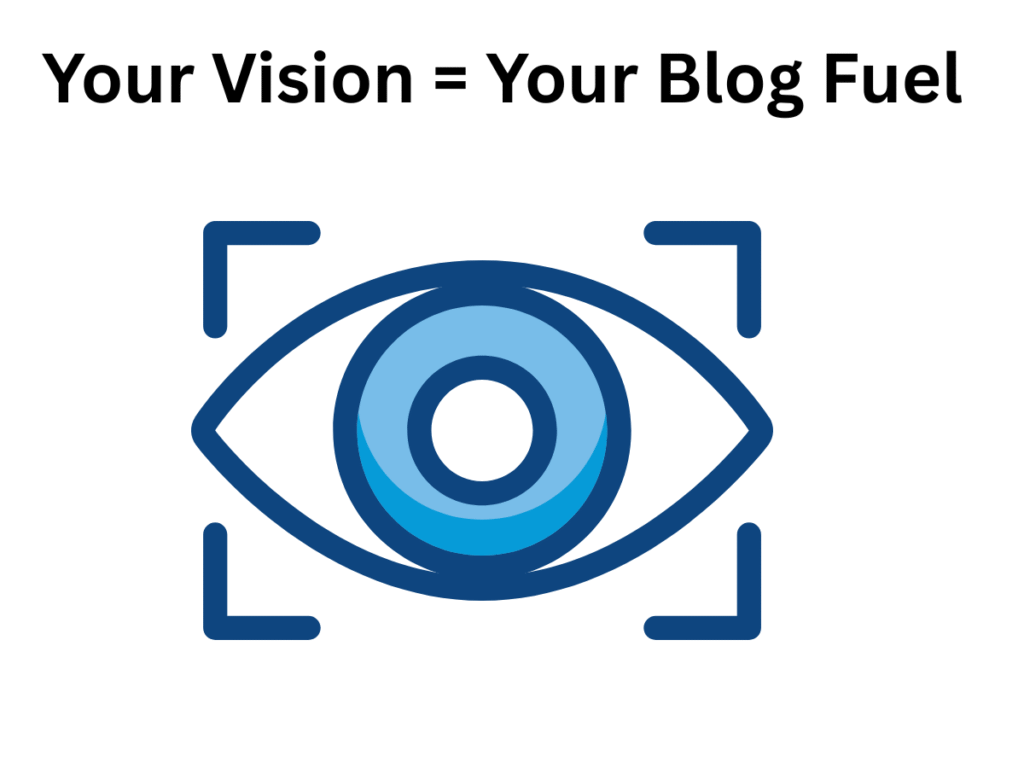
My vision is to focus on using more environmentally friendly resources.
I want to see a clear, clean Earth, impacting millions of lives who suffer to get even clean water, food, shelter, and other resources. I want to make sure everyone knows what’s happening around Earth and what needs to be changed.
Question no.5: What Do You Want To Achieve?
I want to achieve building a website that is the cornerstone of the climate and Environment Industry for authentic real information, inspiring and educating people.
My special focus will be on students who can achieve heights and make their life and health better.
I will achieve a satisfaction of helping people, + will make money that can be reinvested in new campaigns that focus on improving the earth, like Save water, plant more trees, etc.
Now, the next Question no.6: Who Is Your Target Audience? This is super Important to define initially.
Well, my target audience is mainly school, college students, aged between 10-25, and even working professionals from 25-35 – actually everyone of every age, but they are my special target, and I am not targeting a single country, I am writing for the entire world.
If you want your brand to grow locally or grow in 1 Country, then consider the same for one country like India, the United States, etc.
Now, the Question no.7: Should I Blog Privately Or Publicly?
Well, it depends on you, if you want to reach an audience, then make it public, else if you want to blog as maintaining a personal diary, then you can even keep it private.
Next Question, no.8: What Will Be Your Tone Of Writing? Well, it means the way you will represent your content, is it professional, informal, like a friendly tone, casual, funny, humorous, etc.
You can choose multiple options here if you want to, it’s your choice.
Another interesting Question no.9: Will You Share It With Family & Friends?
It’s optional, not mandatory, many hesitate to share with friends and family, I think the same, I do share it with my core family though, but my friends, no way. Not everyone in your list is your true friend, actually, right?
It’s because not everyone is your target audience remember? Not everyone is your true audience.
Crucial Knowledge: On a website, if a reader comes and goes straight away after a few seconds, it tells Google your content is not worthy, and you may not rank – this is called bounce rate, there are 50+ terms like these, don’t worry, you will learn about them as you continue blogging.
Now, brainstorming Question No.10: Is It Going To Be My Hobby Or A Long-Term Business?
For me, if I run this climate change website, yes, it’s going to be my full-time business, for you, depending on your time and Interest, it can be a hobby too. It’s important to define this right from the beginning.
Next, focusing on Question No. 11: How Much Time Can I Dedicate Daily, Weekly & Consistently? For me on a daily basis, I can dedicate 2-3 hours, and weekly, 15 hours, for you its upon you.
Don’t bluff here, like initially you may think, yes, I can write 30 hours/week, and after 1 month you’re going down to 3-5 hours/week, set realistic goals, and plan accordingly, consistency is the key, remember?
Question no.12: Do You Want to Teach, Inspire, Share News, or Entertain? Yes, I want to educate, teach, and inspire people. I can even share daily news, on the environment, climate change, and Global warming, as they are real topics.
Think about what you will do here.
Question No. 13: Do I Want To Monetize My Blog?
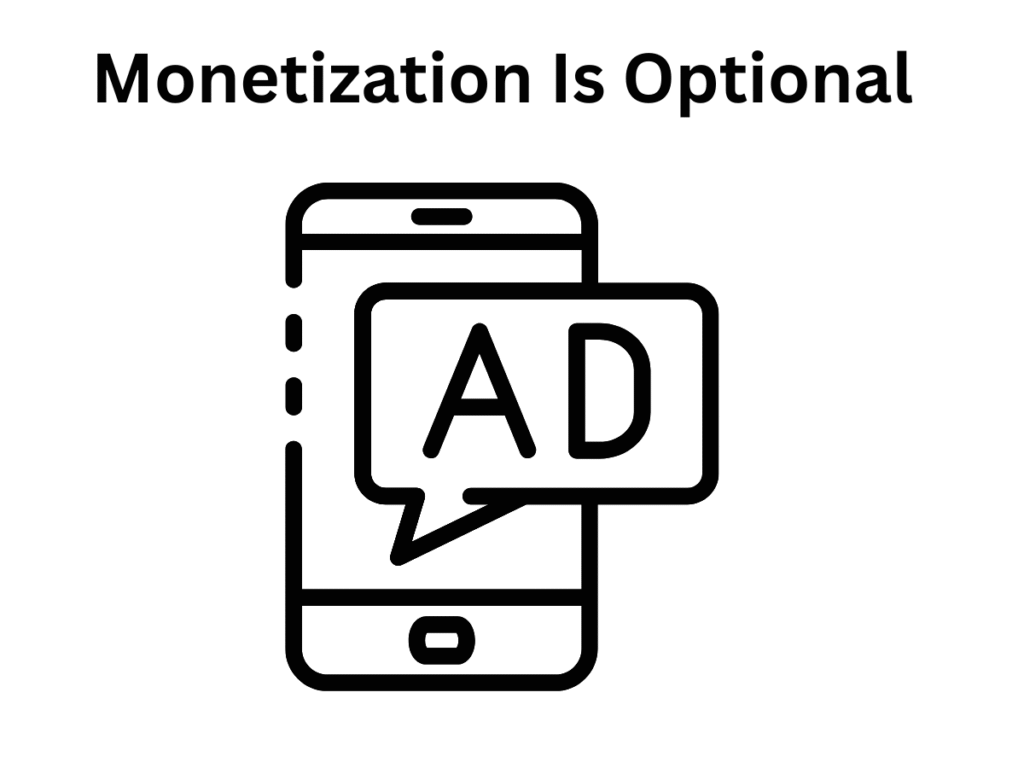
For me, it’s a real project. Yes, some money can passively help me create more content, and I can add more features to my website. What about you?
If it’s a personal diary, then there are chances you might not monetize your blog.
Question no.14: Do I have Money To Buy Hosting & Domain? Well, Investment is crucial, I will invest some money, free platforms can help me start but I want to scale my website later on, I will invest right away.
This is a big decision, it can make or break your website, decide wisely 🙂
Question no.15: Should I Invest In Premium Tools Initially? I will wait for some time to see initial traffic since I don’t have money left, if you have some, invest it, you will benefit.
Now, last Question no.16: Should I Look At It As A Career Option?
I will be looking at it as a career option, but if you are working, don’t leave your job or studies; do it side by side. if you feel you have a stable income consistently, then think of it as a career or still do it side by the side.
My Short Story On Brainstorming Session (Continued)
When I started blogging back before the pandemic, I didn’t have any idea about this brainstorming session. I started writing about rising environmental issues, randomly, enjoyed writing my content, but there was no focus on structuring, and I wrote what I loved.
It was super cool, but again super energy draining, as the views were minimum.
I learned brainstorming, I think, after the pandemic, and since then, I have been doing structured blogging. I learned who my audience is, how they think, what they love, and since then, I first research and then I write., This helped me earn decent money too.
Tip: I struggled For Years To Find A Clear Path, Even Though I Gained a Good Amount Of Views, But This Took A Lot Of Time & Energy, Always Prepare Before Execution.
Now, let’s move on to the step-2.
Step 2: Learn 8 Golden Steps On How To Select A Blog Niche
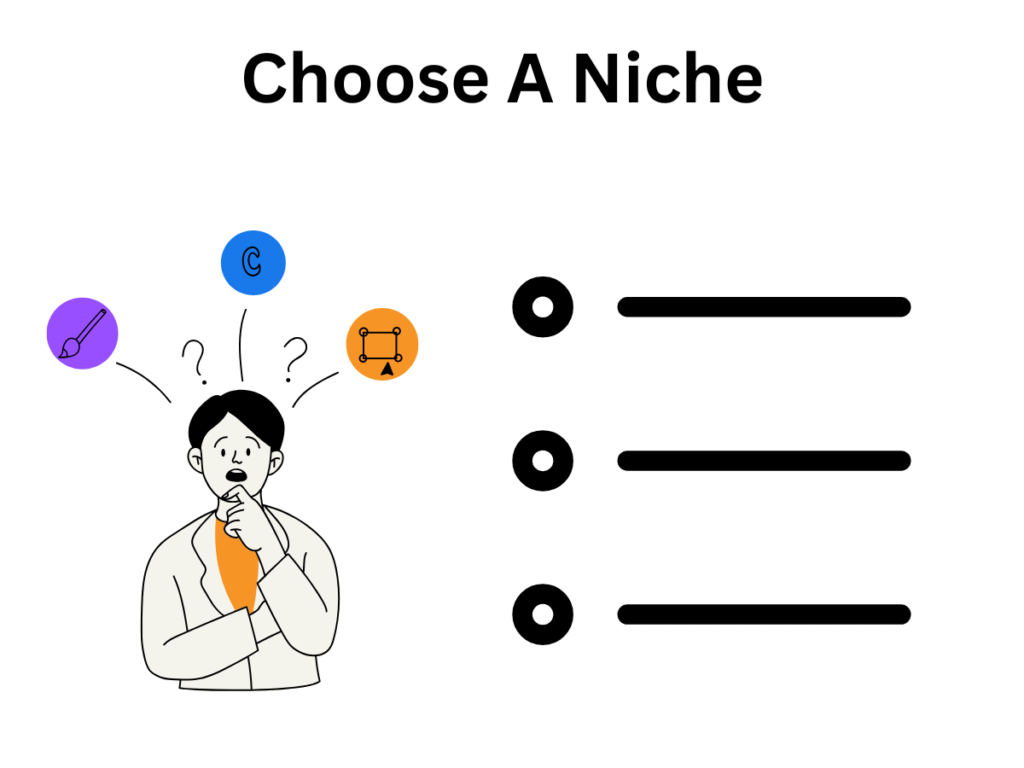
This is probably the most interesting and most difficult part of your journey. It’s the most important; if you do anything wrong here, your blogging business future will be squashed.
The Only Option: You have to be right here – No Excuses At Any Cost!
Let’s start with the simplest question at this stage:
What is a Niche?
A blog niche, in simple terms, is a specific topic/ covering an industry, or even a subject area, on which you write and have specific knowledge.
A Niche helps you to focus on a specialized topic that you choose, craft content, narrow the audience, and focus on a targeted approach, but still has the ability to focus and reach a broad audience.
Why Do You Need A Niche?
A blog niche is needed to make sure you are writing for a particular domain/industry and represent some expertise while talking about it. It helps you to craft content on those specific topics that can help you build authority, trust, and people can learn and take help from you.
You need a niche because it helps you to focus on a specific audience, and even though the audience range is small, it is strong enough to influence people in your industry. moreover, people from other domains can still follow you, right?
Still, what matters the most is whether you can connect and entertain the audience and their pain points; if you don’t solve their problems, then even if you have a niche, you won’t succeed.
Now, there are multiple crucial steps involved on how to choose a niche and but let’s pay attention to the practical steps that actually make an impact and can help you write blogs for years.
If you are a beginner or even an intermediate blogger, my method will help you to choose a niche in no time, because choosing a random niche and failing later will break you mentally, physically, and emotionally, your confidence will shatter, hence, follow what I learned over the years.
If you have already started blogging, or tried before, and want to switch your niche, follow the steps.
If you seriously want to make money in the long term, a niche is a clear deciding factor (I will explain below why).
To know the secrets behind choosing a niche, there are 7 practical steps no beginner can miss; if you miss them, you miss the reality.
8 Practical Easiest Golden Steps On How To Choose A Niche
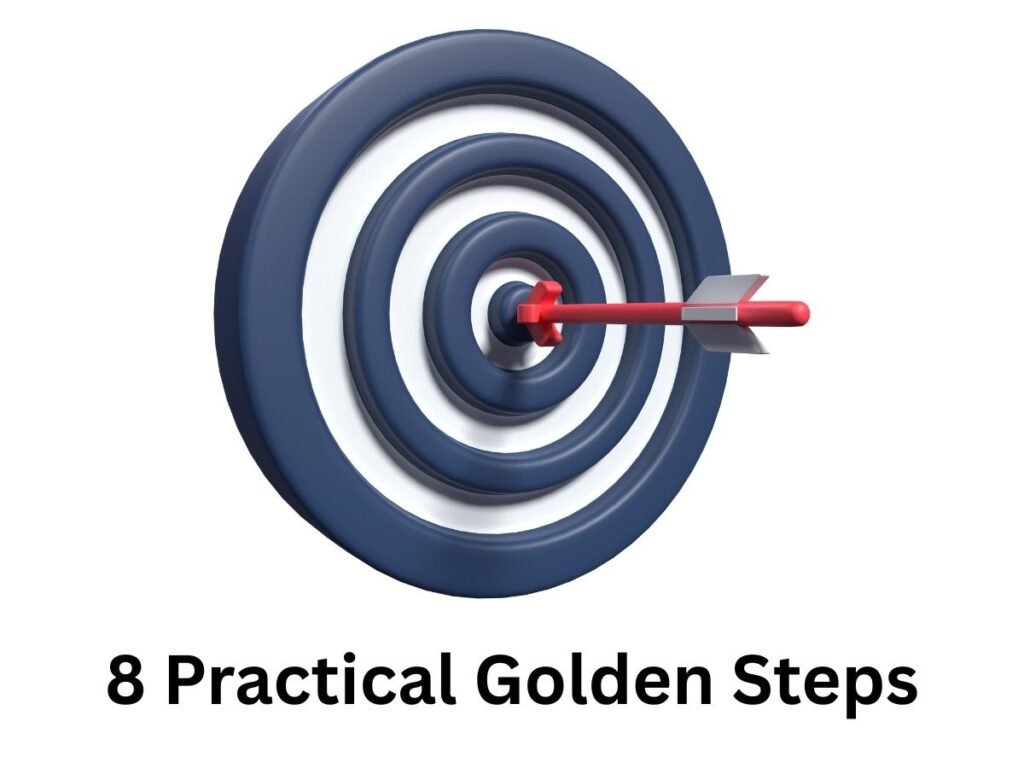
A niche decides the type of audience and the type of articles you will write. Yes, different niches require different writing tone, like for yoga, for medical blogs, for athletes, the readers and their requirements are different.
- Step 1: Identify Your Interests & Sources
- Step 2: Broad Or Narrow
- Step 3: Market Demand & Supply
- Step 4: Audience Selection
- Step 5: Future Growth Potential
- Step 6: Analyzing Competition
- Step 7: Monetization Potential
- Step 8: The CASH Formula
Let’s see how you can follow every step practically, without facing a lot of stress; rather, you will enjoy this process.
So, starting with Step 1.
Step 1: Identify Your Interests & Sources
It’s seriously interesting, valuable, and yet avoided by beginners. What you love will eventually help you to write more without facing burnout.
By reading the previous practical brainstorming session, you would have already realized what interests you, right? Review your school books or extracurricular activities, and brainstorm what excites you. Based on this, select 5-10 niches, and then finalize one niche.
But what if you tried this before and it didn’t work at all?
That’s where the true Sources Help you 🙂
Sources can be classified into 2 types:
- Researched Sources: These sources are derived after you researched what people talk about on different social media platforms, like digital marketing, gaming, cooking, etc., based on that, you can choose one of your choice.
- Human Sources: This is needed when you are still confused. Ask someone from your family, friends, or your teacher what you are naturally good at. If it’s teaching or some hobby/activity, then you can laser-focus on that niche; it’s called driven guidance by real life.
Deep thinking and manual research are some of the best ways to identify your golden niche, even though you can get recommendations, you have to sit with those ideas and think a bit of what’s valuable to you more.
Kindly don’t use AI tools to choose a niche, yes, you can get ideas about current trends, but you are not here for a shorter period, you need to build your blog website & digital empire, don’t follow trends, follow the niche itself.
Remember, you have finalized 5-10 niches? Now, let’s see more 6 steps to understand which of them is best for you practically.
Step 2: Broad Or Narrow
Now, let’s assume you decided 5-10 niches, and you will go with:
- Climate change
- Gaming
- Mobile Phone Reviews
- Veg Recipes
- Swimming
- Running
- Yoga
- Smart water bottle for hikers
Now, we need to check whether or not your niche is broad or narrow.
Broad niche means a subject/topic that covers multiple topics, vast, deep knowledge, like science – covering physics, chemistry, etc., or let’s say technology covering mobile, laptops, cars, drones, etc., all of them can be further classified so they are broad topics.
Narrow topics could be like yoga for children under 10, sharp, focused, but narrow, right? Another could be the keto diet for working professionals, definitely a good idea, but here’s the interesting part.
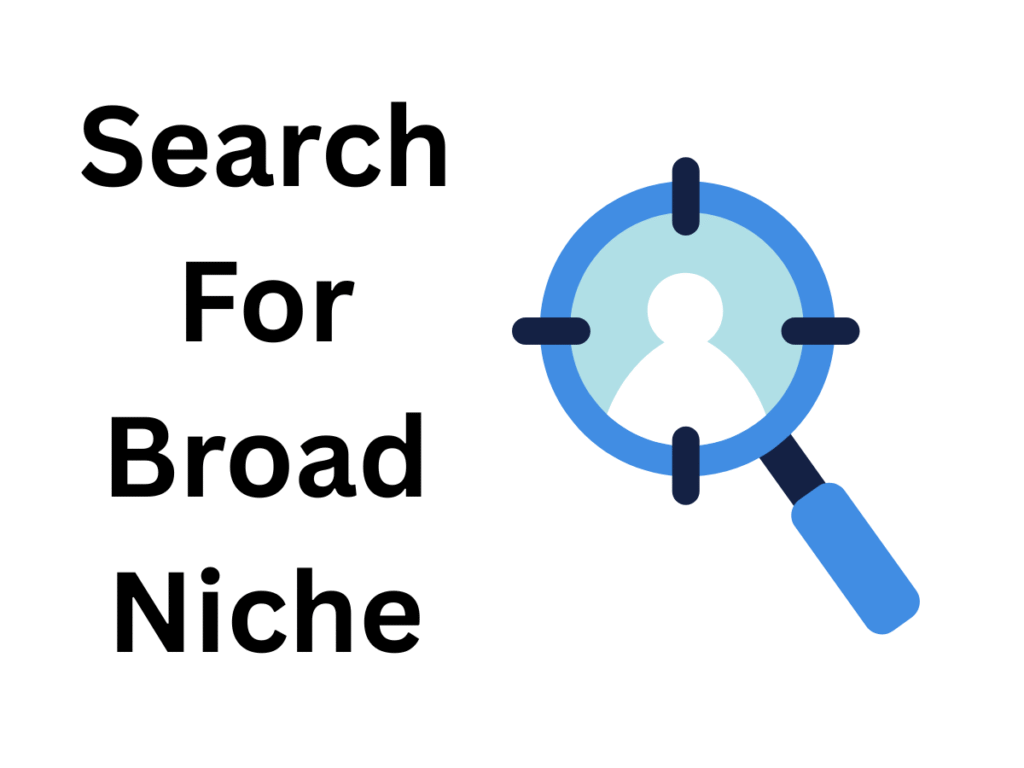
If you buy a domain regarding this, say for example ketodietforprofessionals.com, then later it will be hard for you to expand into other diets, right? Since Google and other search engines will think that you are focused on keto, now why covering more? This can confuse Google. A name like dietadvice.com is logically covering a broad vision and yet covering keto too, understood?
So choosing a niche will influence your domain name, search engines’ understanding too – hence choose both wisely, continue reading to understand the reality.
Now, since you chose some niches above per my assumption, like climate change, gaming, veg recipes, mobile phone reviews, running, swimming, yoga, smart water bottle for hikers, etc., look at which is broad and which is too narrow.
Master Tip: We will start with a narrow niche within a broad niche. why?
So that we can expand later on. You cannot be stuck with 1 thing for your entire life, and practically, how many questions/ topics can you actually cover in 1 narrow niche, right? Someday, you’ll cover everything within that niche, so next what?
This is why always choose broad as a real niche, but start with the narrow tip first 🙂
Step 3: Market Demand & Supply
Now, since you understood what narrow and broad niches mean, decide on a broad niche + a narrow niche within it, for all 5-10 niches chosen to understand what suits you.
Now, for all the niches, we need to see whether or not people actually search for it on the Internet or not, or whether there is a market demand & supply for that topic.
Market demand & supply here means checking the total views/ potential of the chosen niche, weekly, and yearly.
But why we need to check the market demand & supply? This is because we need to be assured whether the niche is seasonal or not!
Examples: Best Diwali Gifts, Christmas Gifts, their reviews – well, they are seasonal, right? But what about a yoga routine for beginners, or working professionals? Digital Marketing – These are evergreen niches and are searched every day, every month, every year, right?
We need to choose a niche that is searched for almost all year round 🙂
To check market demand and supply, do the following (super-important steps):
- Go to Google, search for that niche, like for example climate change, and see whether people are searching for it or not, are there blogs? questions? Suggestions? If yes, well, it’s a good niche to target. – Even though competition is here, it means it’s worthy enough to attract an audience.
- Do the same for YouTube, search your niche/topic and check whether there is content, if yes, how many views are there, are people interacting, commenting?
- Repeat the same for all other social media platforms like Instagram, Facebook, check, groups, posts, whether people talk about them or not, and also check the Amazon, flipkart, Doordash, apps to check the demand of your niche.
- Now use a tool like Google Trends to check your niche demand and supply. But how to use this tool? You can do the same with multiple tools, but we will discuss them down below. Let’ focus on Google trends for now.,
Go to trends.google.com (search for the term “Google Trends” on Google – it’s a free tool), click on the search, type your topic, or go to explore above, write down your niche as in the picture down below, and then check the pattern.
This is how to use this tool: go to explore, type in the search term, your chosen topic, for example Digital Marketing

Below are a few examples of Google Trends for these specific keywords.
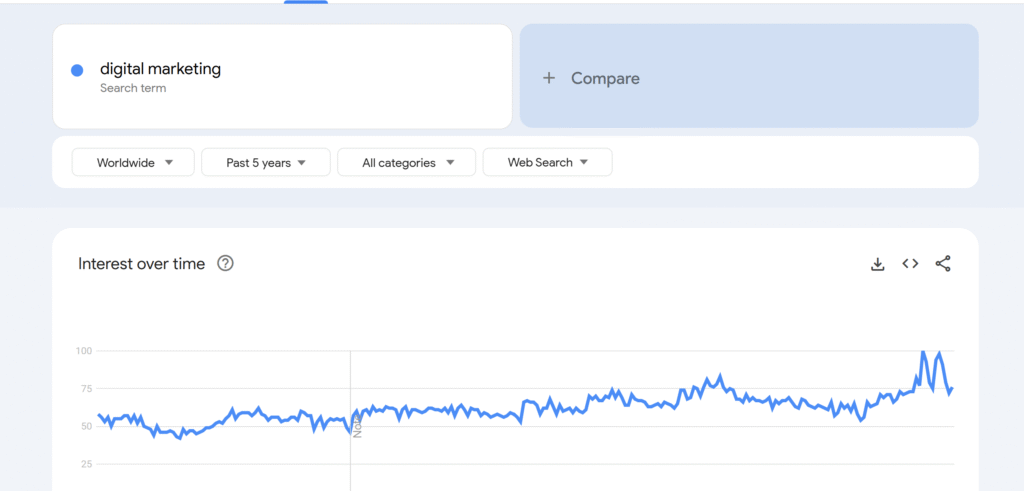
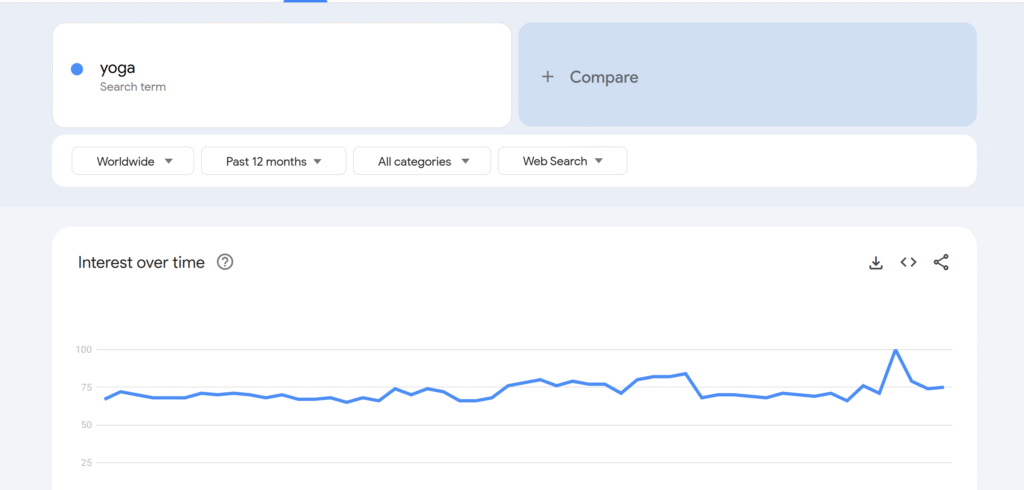
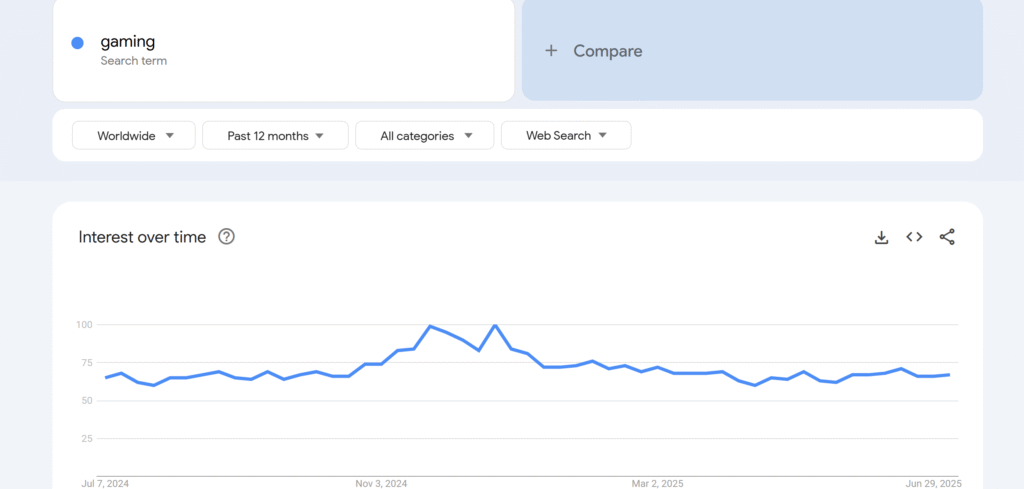
If the average score is above 30, it’s good, go for it, but try to choose one above 50, it’s a great niche to start working with, but don’t focus on numbers only, focus on your passion too. Check the trend, and analyze which one is worth it.
This trend checking is important to understand whether or not you can make money out of it or not.
Step 4: Audience Selection
The audience selection is what we have decided during brainstorming, but do it again, since now you are choosing the niche, so you can analyze your performance and logical thinking.
Who is your audience? Who are you going to write for? What will be your tone of writing? For example: A medical domain writer will be professional, while someone writing the latest game reviews can use a casual and friendly tone of writing (audience range can be 13-25, mainly), someone focusing on baby toys, the potential audience will be for babies, but targeting parents of age 25-35 most probably since they are the ones who will be searching for it right?
So think logically, search, and do this for 5-10 niches, till now you can come down to the final 3 niches, and eliminate the rest that don’t qualify for above steps.
Step 5: Future Growth Potential
Check real markets, real paper, read newspaper, and try to think, analyze, and monitor the future growth potential, ask AI too if needed, that whether my domain has a real future or not.
Because you can only make money if your niche stays relevant, why will advertisers pay for something that’s going to be outdated, right? To enable ads and get sponsorships, choose a domain that has future growth potential.
For example: Electric cars, renewable energy, climate change, Digital marketing, yoga, veg recipes, etc., – they are definitely not going to be outdated anytime soon.
Step 6: Analyzing Competition
Your competitors are your real options, to track, see what they are doing, which topics they are covering, and by that you can already get ideas, and edge over them.
For example: Go to Google, search for a keyword/ your niche like “gaming”, then some articles appear, click on them, check the domain names (names of the website), open excel, save the names, at least 5-10 names, and then continue looking at how they write, how they produce content.
Master Tip: Install an extension DA PA Checker by Moz (it’s free), but why? DA means Domain Authority, and PA means Page Authority; they are factors that matter to rank on Google. The Higher the DA and PA of a website, difficult for you to rank like Forbes, YouTube, and Microsoft websites have high DA, PA; you cannot compete with them.
Check competitors with DA, PA less than 10 or 20, and focus on them specifically.
Step 7: Monetization Potential
Now, it’s important, right? Many of you want to earn money, and that’s why you are going to launch your blog website. So, for this, check out your competitors and see how they have monetized themselves, are they running ads, listing affiliate products, etc.
Check out Google, or ask AI like ChatGPT, and you will get a quick answer on how to monetize your blog in your niche.
For every niche, monetization can be a bit different.
Step 8: The CASH Formula
Just ask yourself one Question:
“If you receive 0 views for 1 year straight, which is that one niche/topic that you can write without burnout, without even thinking twice, you can write for hours, and enjoy writing about it?
- C = Craving (This means audience is actively looking fit it, its always in demand)
- A = Attraction ( Do you really love what you will cover?)
- S = Solvability ( What real-life problems do your blogs/writing solve?)
- H = High Value ( Whether you will be paid or not, it means are there any ads, products listed online for that niche? Check profitability)
Now, after going through these 8 golden steps, you will be able to choose your final niche, and let’s assume it’s “Yoga” for now, to understand other steps of how to start a blog 🙂 Congratulations on choosing your niche 🙂
My Story On Selecting The Blog Niche (Continued)
I have struggled initially while choosing the niche. It’s because, when I started i didn;t even knew, something like niche exists. I wrote environmental blogs, news, created multiple categories but realized after months that I do need a niche.
For some of my websites, i learned form many videos, blogs on how to choose a niche, like looking for profitability, passion and write, but these 2 factors were alone not helping me.
I tried more manual research and since my last 3-4 websites, I am using my 8 Golden method and its working perfectly for me, below in the silo structure part, I’ll show you how to categorize easily.
Let’s move on and select a domain name for your website now, so that you can start running your website.
Step 3: 11 Steps On How To Choose A Domain Name
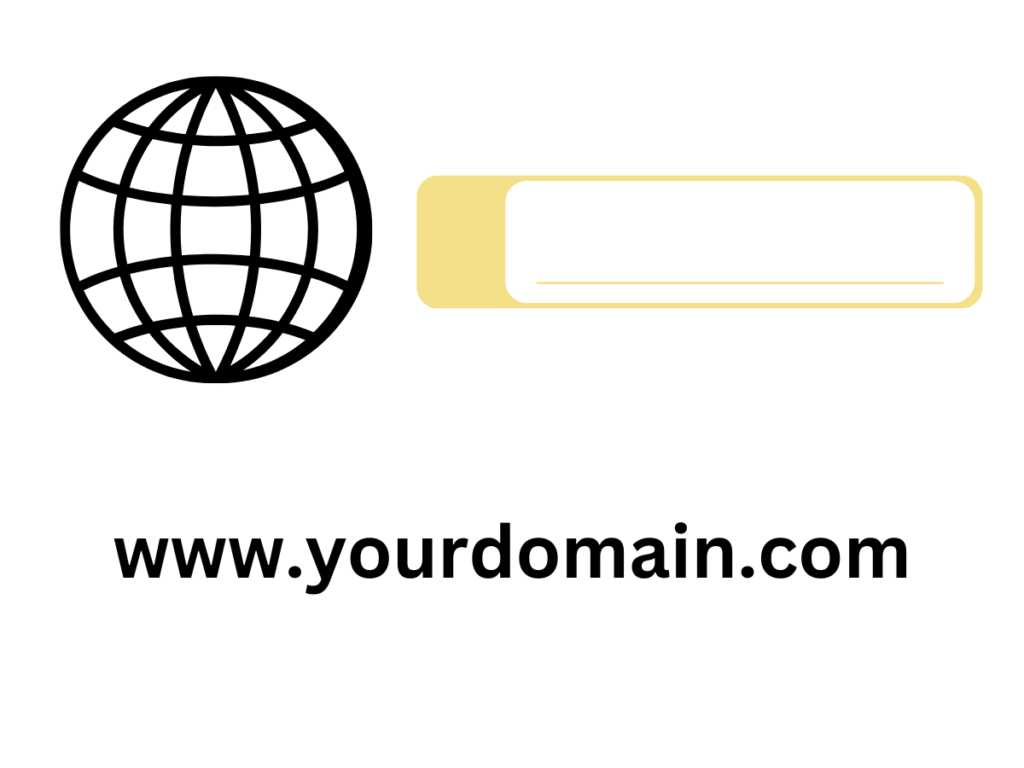
Choosing a good domain name is crucial for your brand’s success, even personal brand success, and the domain name represents what value you offer.
Choosing the right domain name for your personal blog or business is important since people remember your name; the easier and shorter it is, the better it will be.
For example, Amazon, Nike, and Google are some amazing, memorable names, right?
There are 11 golden steps to choose a unique domain name:
- Easy To Spell
- Must Clear The Sound Test
- Follows EPIC Formula
- Keywords
- Memorability
- Length
- Descriptive
- Brandable
- Domain Extension
- Uniqueness
- Additional Generators
1. Easy To Spell: A domain name must be easy to spell since if you are targeting a global audience, then it should be easy to spell, as the audience then it their language all differ.
For Example, google.com, timelessaim.com, are all easy to spell, while something like gamingsquadproz.com, or google12375.com, it’s not easy for everyone, right?
2. Must Clear The Sound Test: Once you spell it, it should also clear the sound test, i.e. by listening only, people should be able to recall the correct spelling of your domain.
Example: timelessaim.com, easy to type, while newsfactz.com, adding a “z” to match the competitor, makes it difficult to sound better and type too. Also, nikepros1000.com doesn’t sound cool right? What 1000 number or numerical spelling? Cannot convey in 1 line, right?
3. The EPIC Formula
Its like a secret sauce and you can use it to check how much better your domain name should be in reality.
- E means Emotional (Your domain should evoke emotions/have a touch of emotional connection)
- P means Punchy (It should be powerful, and must get stuck in your audience’s mind, short & easy to spell)
- I means Infinite (It should not limit your niche, remember? Select a broad niche. Like yogadaily.com, not yogaforkids.com (can still work, if you only focus on it, but being broad, you can expand later)
- C means Catchy (Domain name should be catchy, attractive)
4. Keywords
Keywords means topics/niche that you choose. Like if your niche is Yoga, then having a domain name with yoga word on it can give you added advantages, like SEO advantage, we will learn more about it later.
For now remember, our website and blog gets traffic with better SEO, it helps search engines to rank our content better.
It’s not mandatory to have a keyword attached to your domain name; if you have it, it’s alright, good job.
5. Memorability
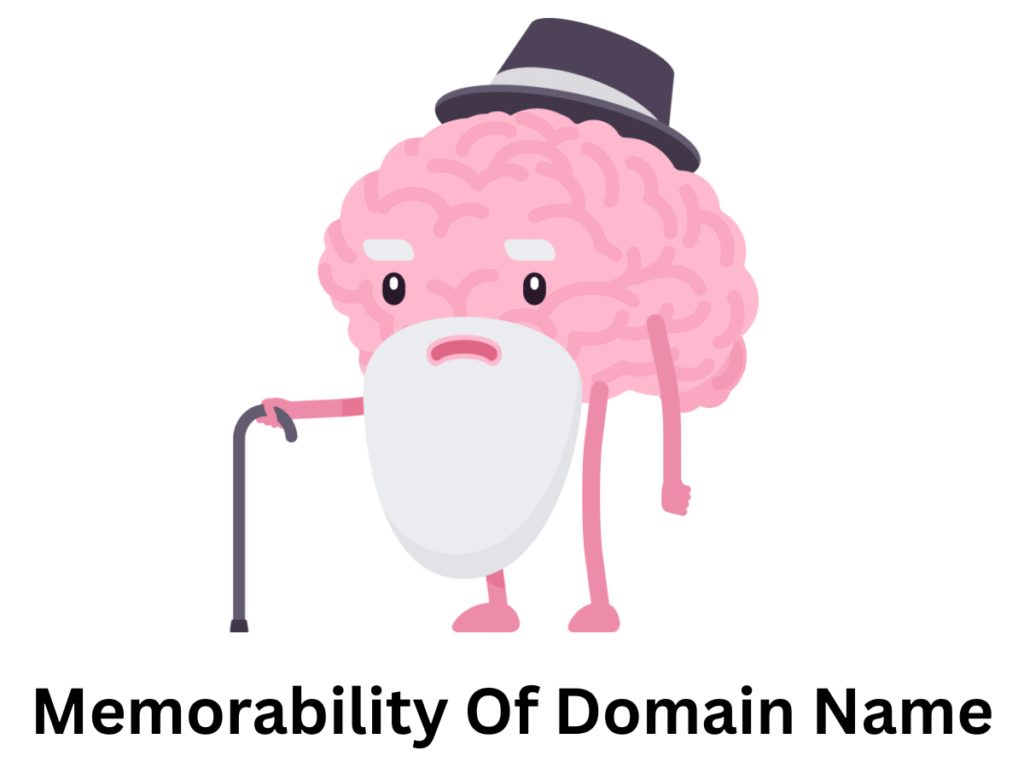
A domain name should be easy to remember. Like google.com, youtube.com, timelessaim.com, all are under 15 characters. Don’t add unnecessary words to attach competitors’ names or make it sound cool, according to you.
Think of a name that matches close to your brand, tells your brand story, choose it, book it, register, and start your journey!
6. Length
Try to limit your domain name to its 15 characters. Something like gamingprosforbeginners.com, its hard to recall and remember.
Apple, Google, Puma, Nike, and Amazon are short and easy to remember.
7. Descriptive
It simply means having a broader approach so that you can expand later. Having your own name as a domain can be a good idea.
Let’s say your niche is yoga for kids, then a domain with yogalessons.com can give you the ability to adjust with expansions rather than yogaforkids.com. Here, if you later write yoga lessons for adults, it’s not so compelling, right? It confuses search engines and even audience sometimes.
8. Brandable
It should be brandable too, try to focus on making it a global brand, rather than a personal brand, yes it’s good too, but something like nike.com is better than name.com.
9. Domain Extension
A domain extension is a really important factor to consider, as there are multiple domain extensions you can choose from, but how will you know which is best for you?
Some of the best domain name extensions are:
- .com (mostly preferred)
- .org
- .co
- .in (country-specific, like this is India, then there are .co.uk, .ca, etc., so choose accordingly if you are targeting a specific country)
- .xyz
- .net
- .ai (recently in demand)
- .blog
- .io
- .biz and many more
10. Uniqueness
Don’t copy other brands’ names or grab their names with other extensions, it’s not legal, and good for your brand reputation in the long run. Choose a unique name, and stick to it.
11. Additional Generators
There are online domain name generators, and even AI chatbots, use them to generate names quickly, but i will still say, brainstorm for better results.
Some of the domain name generating websites online are:
- Shopify – Domain name generator
- Instant Domain Search
- Namelix
- Ai tools like ChatGPT, Gemini, Perplexity.ai
My Story On Choosing The Right Domain Name (Continued)
There are many steps you will witness online. I have tried many, but only some of them are practically helpful.
Among 10+ domains that I have purchased, some of theme didn;t made any sense, due to keyword stuffing, trying to focus on length only, such things stucked my potential and ruined my website.
After getting tired, exhausted trying online methods, After the pandemic, my professionalism woke up finally, and I tried my own method, and discovered that this is seriously giving me an edge and saving a lot of time since choosing a domain name can be time-consuming.
Earlier, I used to take weeks, thinking of a name with other online methods, now, since I tried these 11 steps combined, it takes a day or 2, sometimes, even an hour to select a domain name, depending on the complexity of the project/website work. This technique is that good. But yes, brainstorming is required.
Step 4: Choosing The Best Blogging Platform
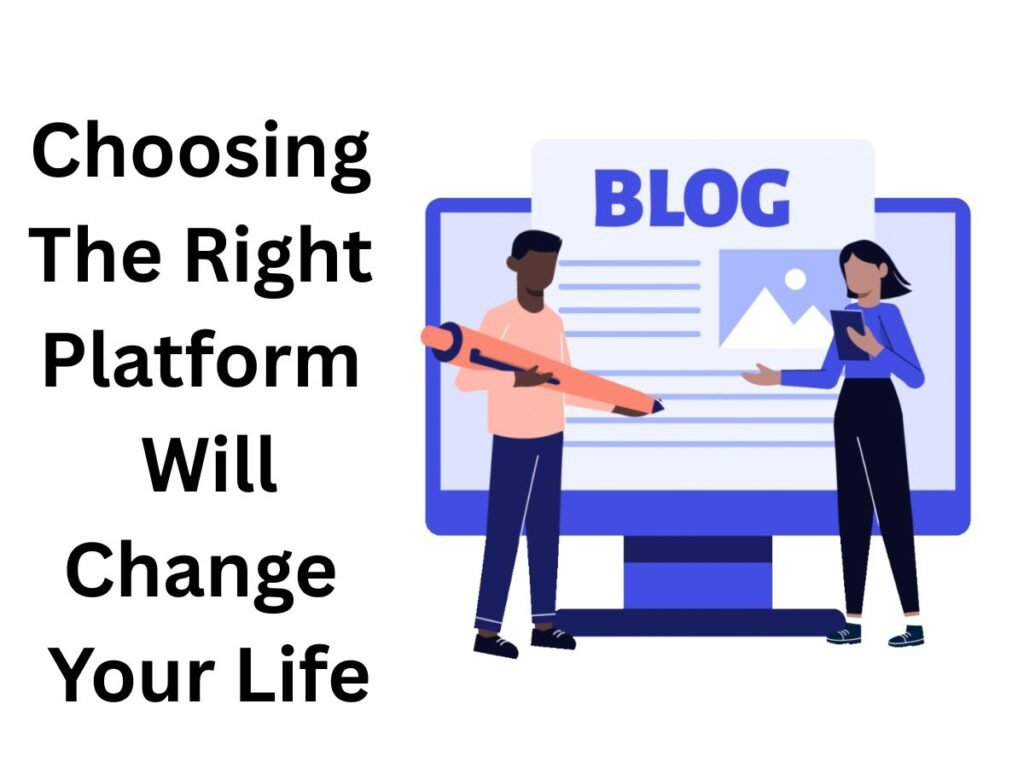
A blogging platform is crucial for your website’s success. You have to choose a blogging platform that suits your level of expertise as well as the type of blog you want to launch.
It can be a hobby or a business, and some of the platforms are free while some are paid. But what exactly is a blogging platform?
What Is Meant By Blogging Platform?
A blogging platform, in simple terms, is a software that allows users to create content, manage and publish it without any problems, and you can scale your project as per your convenience, from any place, at any time.
It provides important beginner-friendly tools, and is extremely user-friendly, especially software/services that allow us to publish articles/videos/podcasts, product reviews, and much more in no time.
There are 16 blogging platforms I have selected after years of research that you can choose to start your blogging journey.
Before revealing the list, its important to realize how to choose a blogging platform for your needs.
How To Choose A Blogging Platform?
You can choose a blogging platform based on the following benefits:
1. Your blogging platform must be reliable, trusted
2. It should be easy to use for beginners and must have an easy learning curve
3. What is the purpose of your blog? The platform should be based on this, too
4. It should be SEO compatible, customizable
5. The platform must be scalable
6. It should be mobile responsive
7. It must be cost-effective
8. Should support multimedia
9. Must be monetizable
10. Should provide analytics to analyze data and sources
11. Should provide support and community
12. Must be loaded with Features, Flexibility, must integrate with other platforms, must be updated frequently, and should be reputed
Here are the 16 Best Blogging Platforms. You need to choose any 1 and start your blogging journey. You can even experiment with multiple platforms first before finalizing to work with your dream project. The platforms are:
- WordPress (Recommended) There are 2: WordPress.com and WordPress.org (preferable, comes free with hosting)
- Wix
- Hubspot
- Blogger (Powered by Google)
- Squarespace
- Medium.com
- Drupal
- Weebly
- Ghost
- Joomla
- Substack
- HubPages
- Adobe Commerce
- PrestaShop
- Hostinger Website Builder
My Story On How I Selected My Blogging Platform (Continued)
Back in 2018, I started with Blogger as a blogging platform. At that time, it was good to try with, since I started blogging as a hobby first, and didn’t even know that I could make money with it.
Blogger is free, and I didn’t have any budget, so I started with it, but later I realized that I am looking at blogging as a business, and hence I cannot scale with this platform. Hence, I shifted to WordPress.org.
Till today, I am using WordPress, and it powers more than 42-43% of global websites. I have also tried Medium.com, LinkedIn, and some more platforms.
Step 5: Select The Best Hosting Platform
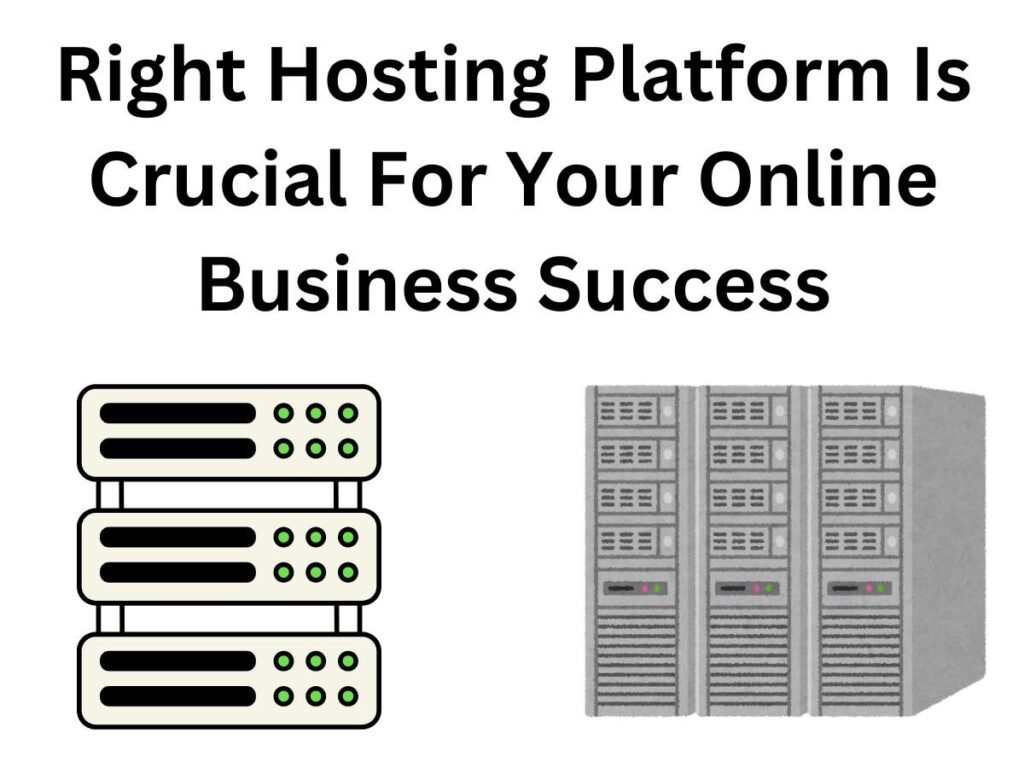
Now, in order to find the best hosting platform, we need to first understand what is hosting.
Remember that different hosting companies provide different plans and services, out of which some are literally amazing. I will give you the unbiased list.
What Is Hosting?
Hosting, in simple terms, is a service that helps your website to stay accessible to the entire world via the Internet, and hosting companies manage everything for you, provide you with resources, and a server where you can store your website files.
Hosting is like renting space on the Internet, like how you buy a house for rent and live there, you buy a limited space for a limited time, and pay accordingly.
Here are the 7 Best Hosting Platforms (WordPress) you can consider to unleash your online business:
- Hostinger (Recommended By WordPress Itself)
- BlueHost (Recommended By WordPress Itself)
- GoDaddy
- CloudWays
- A2 Hosting
- WPX Hosting
- Namecheap
- WordPress.com
All these blogging hosting platforms are fantastic, and you choose any one of them, you won’t regret your choice, that’s a true fact. Yes, some perform better than others in some areas. You can read more about their features on their website.
Remember? Above, you just read how to choose a blogging platform? Well, all these hosting companies should reflect the same, search well, before purchasing, read my story to understand better.
My Story On How To Select The Hosting Platform (Continued)
I started with blogger platform, and shifted to WordPress after a year, it was worth it. but then with so many hosting platforms, I was totally confused which one to consider.
I started with GoDaddy, shifted to Hostinger, and since then I have been using Hostinger only (it’s the best as per my budget.,). Other alternatives, I have seen numerous reviews, and listed them as they are industry-standard hosting companies for decades now.
Step 6: Setup Your Website, Select The Best Theme & Design Your Website
In This Section, We Will Learn How To Customize Your WordPress Website & How To Start A WordPress Website, Step By Step (Practically). 🙂
Now that you have an idea about how to choose a niche, domain name, blogging platforms, and then hosting platform, its time for you to purchase any hosting that you liked.
After purchasing, you can come to your dashboard (WordPress website) and start customization, setting up your website.
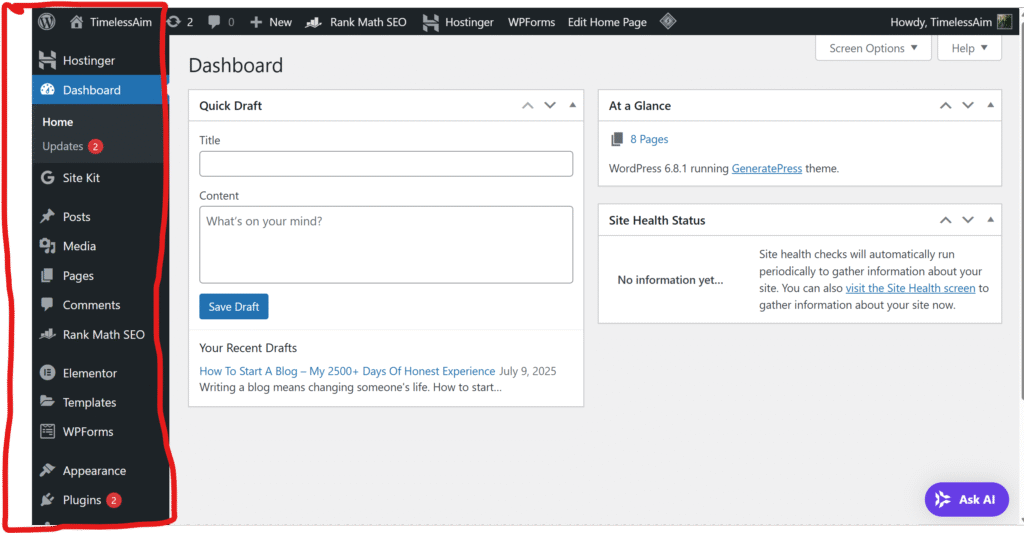
You can see clearly that on the left there is:
- Posts: It contains all our blog posts/articles, click on Add Post > Start Writing Your Blog Post
- Media: It contains all the images, other media that you have on your website
- Pages: Pages mean the main navigational pages present in your header/footer section of your website. For example: Home, About, Contact, etc., you can check them on my website. Posts are contained within Pages
- Comments: If someone commented on your blogs/pages, you can see them in this section
- Appearance: Contains Themes (It means the design of your website, how it looks), change themes first before making pages, and posts
- Plugins: Plugins are tools that help your website to run smoothly; they are like added features to your website. There are 1000+ plugins on WordPress, and I will list some down below that are the best and Industry standard. Every website needs plugins.
- Users: You can add more users, even remove some, and assign them roles as per your choice.
- Settings: Change some settings, play with them, and see what works best for you.
For Appearance> Themes
A good theme can give you instant success, while choosing a slow bad theme can break your website and run your visitors away.
Some themes, after installing, also have starter templates, readymade templates, install them, and save your time designing the website, Blocksy, Kadence, and Astra themes come with starter templates 🙂
6 Best WordPress Themes
- GeneratePress
- Blocksy
- Astra
- Kadence
- Divi
- Sydney
You can even buy premium themes from websites like Envato Elements, as they provide good quality themes, not only themes but also plugins, PPT, audio, video transitions, and much more. It’s an all-in-one market.
5 Best Plugins
Plugins in WordPress are like apps in your mobile phones; they help you add additional functionalities without coding 🙂
- RankMath SEO (Best SEO Plugin I have Used, Yoast SEO, and All In One SEO are some alternatives)
- WP Forms (One of the best to create forms)
- Elementor (Best plugin to design your website)
- LightSpeed Cache (Best to speed up your website if your hosting uses Lightspeed servers like Hostinger, else, WP Rocket Plugin is better)
- SiteKit By Google (Track your performance, and analyze your data)
My Story On Setting Up My WordPress Website (Continued)
I started my WordPress website and used multiple themes, some of which were really slow and bloated. Over the years, I found these themes as the best value in terms of website optimization.
After so many years, after 2500+ days, I realized that only these themes make sense completely, they satisfy user demand.
There are more essential plugins, but to get started, these plugins are great; they won’t slow down your website, and can boost your revenue by helping to focus on creating quality content, from my personal experience.
have loved this step, for my every website I created. Setting up a website is extremely challenging and yet very rewarding.
I always start by setting up, adding a theme, followed by creating pages, customizing the theme, the plugins, and then writing a post – this seriously helps me to set up my entire website within hours.
Step 7: Create A Silo-Structure
This is one of the most crucial steps for blog success. I missed this for straight multiple years, and even though I got some success, it cost me so much time, energy, and money.
With Silo-Structure, you can literally save years, and build your online business way faster 🙂
A silo-structure is often ignored by beginners and many times even by professionals, and this is where it gets serious. By avoiding a silo-structure, you are avoiding success.
What Is A Silo-Structure In Blogging?
Silo-structure in simple words is all about your website architecture, i.e., how well you organize your content, pages and add necessary categories, divide and arrange them in logical order that can help boosting your SEO, so that search engines can come, see your content, and send visitors to your website, rank your website higher, and you earn money.
You can link your blogs, especially by internal linking, add categories to separate topics, and help visitors and search engine bots to go through your website, improving navigation, allowing them to stay on your website for a longer time, and have a smoother experience.
This is why creating a silo-structure is important. Remember, I said in the brainstorming session, step 1, that your niche should be broad, but start with the narrow part? This is where you will benefit.
For Example, let’s have an example of Yoga, let’s say your broad niche is Yoga, then your beautiful professional silo-structure will look like this:
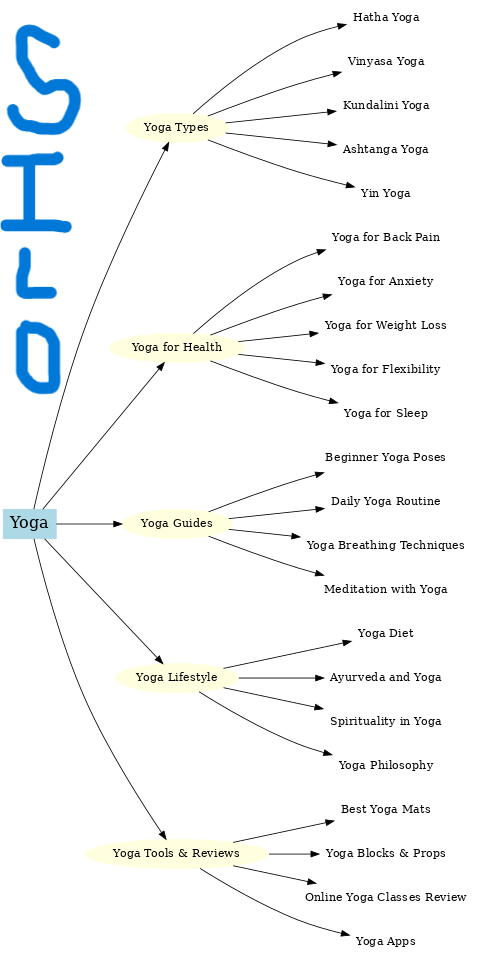
Just like this, create your own silo-structure, and research a lot, ask AI for help, and start from the bottom to cover all the topics, cover at least 20-30 blogs in 1 category before jumping to other section (special rule before you go to monetize via ads).
Silo-structure is crucial as it will help you structure your entire website, this way you can even categorize blogs, do better internal-linking, improving SEO, and you’ll get click on your website but you can also do that using AI.
If you are unsure how AI tools work, you can go and read reviews of AI tools.
My Story On Creating A Silo-Structure (Continued)
I didn’t even know about it, never heard of it until a few years back, in the beginning, I started blogging as a hobby, earned some good money, but never knew something like Silo-structure existed.
After I created a silo-structure, this helped to organize my content even before writing blogs, and this always gives me an edge over my competitors, as I knew that I am doing the right thing, and my website will not confuse the search engines anymore, and I will follow the right direction.
Step 8: Learn Practically: 8 Steps On How To Write A Blog Post (With Tips & Secrets)
Writing a blog post is not easy; it takes a proper approach, following step-by-step formulas that I will share right now, and managing to please your audience by solving their pain points.
How to write a blog post is often ignored, but also always in demand. Many people search for it, but many beginners also avoid it, and simply write without logic, but you are different.
My 2500+ days of blogging experience taught me multiple ways to write a blog post, and for success, we need to use the right tools and strategies. For every level (basic, intermediate, and advanced), the way to write a blog post is different.
8 Golden Steps On How To Write A Blog Post
Here are 8 Golden Standard Steps on how you will write a blog post from scratch on a WordPress website, and even on any other platform:
- Deciding The Topic
- Using Keyword Research Tools (Preferable)
- Manual Keyword Research (Effective)
- Using An SEO Tool
- Writing Hook
- Introduction
- Body
- Conclusion
- CTA
- Schema Markup
- Title, Meta & Description
Before Explaining, remember, for beginners, intermediate, and advanced bloggers, the way they add and expand these steps is different, I’ll show you down below 🙂
1. Deciding The Topic: After creating the silo-structure and choosing one category, start discovering topic ideas related to it.
For example: Above there is a category called yoga for help>Yoga for sleep> choose one topic and start discovering how other people write, and prepare their content, (notice headings & sub-headings.
2. Use Keyword Research Tools: First, understand what is a keyword research tool and what is a keyword.
What Is A Keyword in Blogging and SEO?
A keyword is any phrase or word that you type in search engines like Google and search for it; after that, you get some results which are mostly blogs.
For example: How to start a blog, best cafe near me, dog food, best books for chemistry class 10, etc., anything that you search on the internet by typing words, is a keyword in general.
What Is A Keyword Research Tool?
Keyword research tools are like software that is specially made for bloggers, marketers, and advertisers so that they can track how well someone is searching for it, what the trend is, volume, and much more information.
Keyword research tools allow us to discover potential keywords that can solve readers’ problems, and even beat our competitors.
Some of the best industry-standard keyword research tools are SEMrush, Ahrefs, Google Keyword Planner, and many more.
What is Keyword Search Intent?
Search intent means, why is the user searching for the intent, and what is the intention behind that search, is it to find information or to buy a product.
Finding the Search intent is mandatory before writing a unique blog post.
What Are The 4 Types Of Keywords In SEO?
The 4 types of keywords are:
1. Informational: These are the keywords that indicate the user is searching to find information. Example: What is climate change?
2. Navigational: These keywords have an intent to help the user with navigation. Example: How to use search bar in Google, support page of LinkedIn
3. Commercial: For users who are interested in a product or a service. Example: Best gaming laptops, best mobile phones
4. Transactional: The intent of the user is to buy the product, and make a purchase. Example: Adobe Premiere, buy microsoft office latest edition
A keyword research tool will help you to stay ahead of your competitors, see what’s working on the Internet, craft a strategy, and earn revenue.
Some of the best Keyword Research tools I have used are:
A. SEMrush (One of the best) –
SEMrush gives you everything, and one of my favorite filters is KD and volume (KD is keyword difficulty, it means whenever you are starting a blog, target keywords having less than 10 KD, the higher the KD, the higher is the competition, and new people never rank that easily nowadays).
The free plan gives you 10 free daily searches, it i enough if you’re just starting out, and want to test the software before making a purchasing decision.
It’s also giving you a 14-day trial, isn’t this super-fantastic? I know, I have used it, it solves your every problem you can imagine.
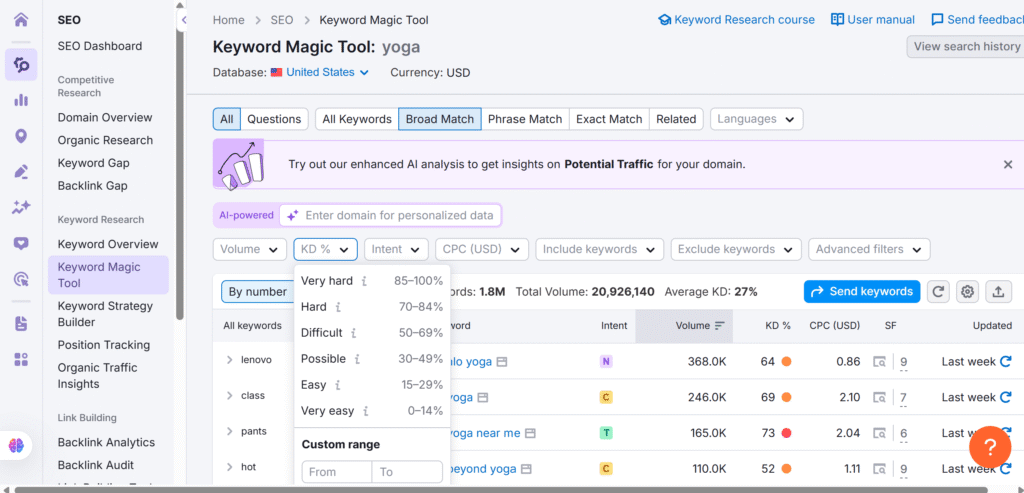
B. Ahrefs: Again, with a close competition to SEMrush, Ahrefs also provides you with everything you need and is an industry-standard tool. You can use various features for free and analyze potential keywords. I personally like their free keyword generator tool, there are multiple free tools you can use, with limitations obviously
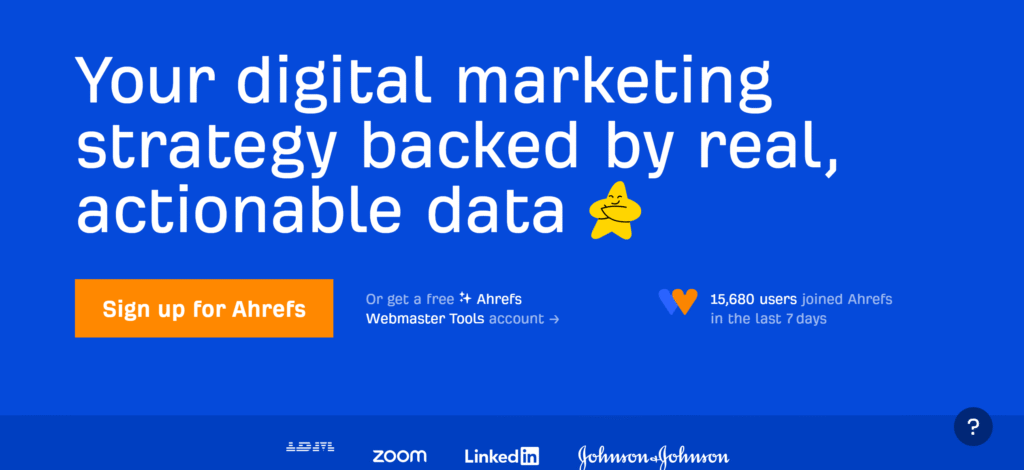
C. Google Keyword Planner: Again, powered by Google, and many believe it gives you the best results, well, it depends from person to person. Yes, it’s Free to use, and can give you potential insights about a keyword.
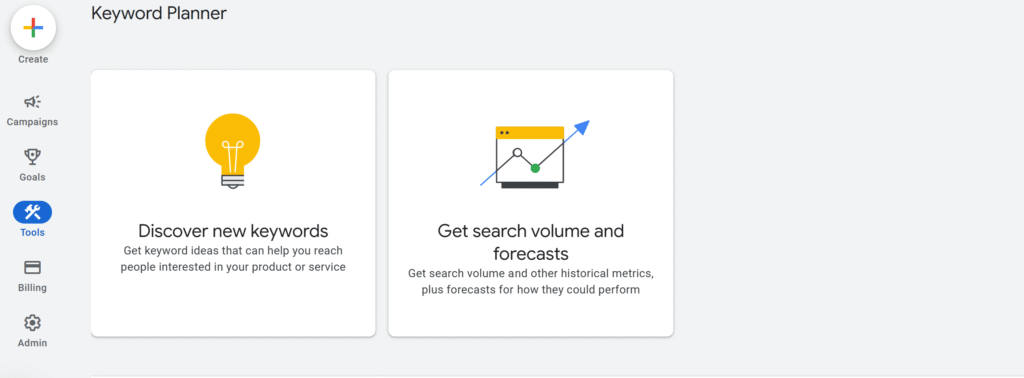
D. Ubersuggest: Ubersuggest is also one of my favorites. I have used it so many times, it’s also pocket-friendly, and helps you discover potential keywords that can save you hours of work.
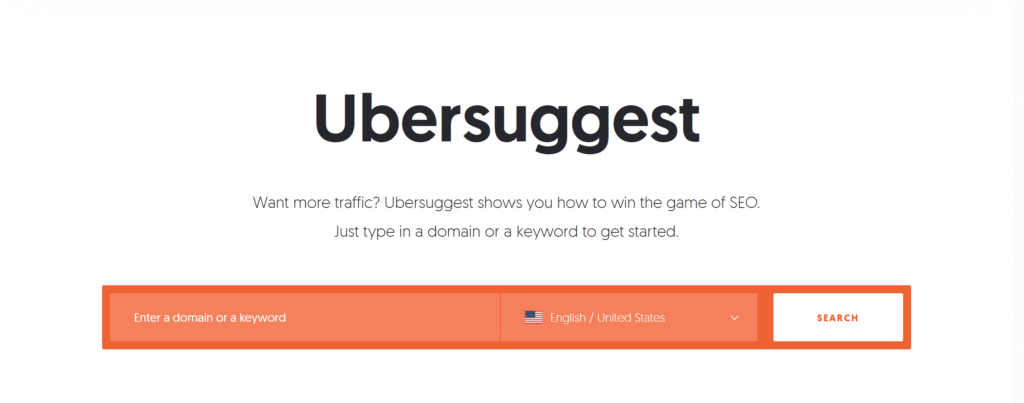
Some more extra keyword research tools are:
- Answer The Public
- keywordtools.io
- WordStream
- Keyword research tool by Backlinko (Its a good keyword research tool)
3. Manual Keyword Research (Effective)
Go to any search engine and type your keyword, like yoga for beginners, and you can see auto suggestions as in the picture, down below. Its the Google Autosuggestions Tool
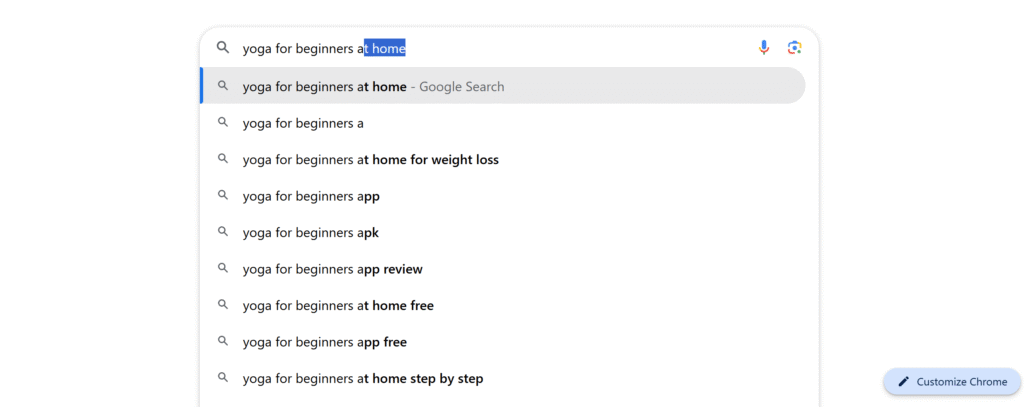
To get topic ideas, you can even search for a topic, and go to these sections like “People Also Ask”, and see what people actually search on the Internet. It works.
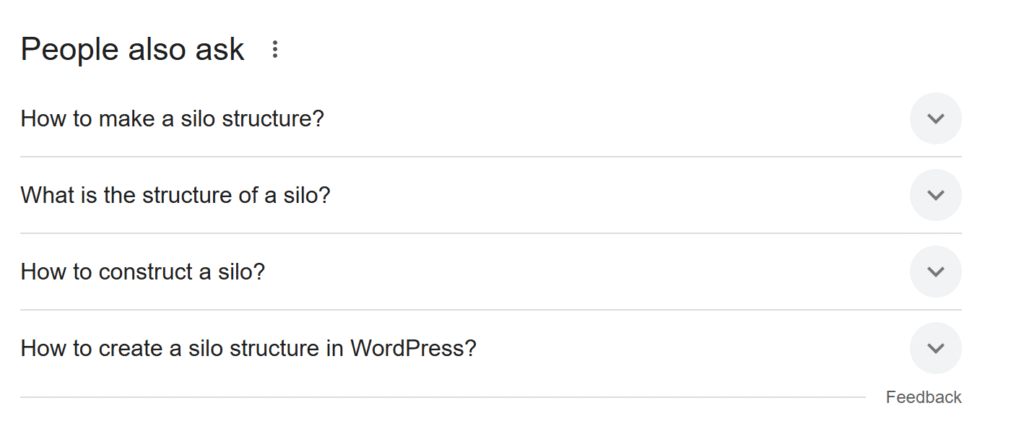
There is also another section on what people also searching for and is shown down below:
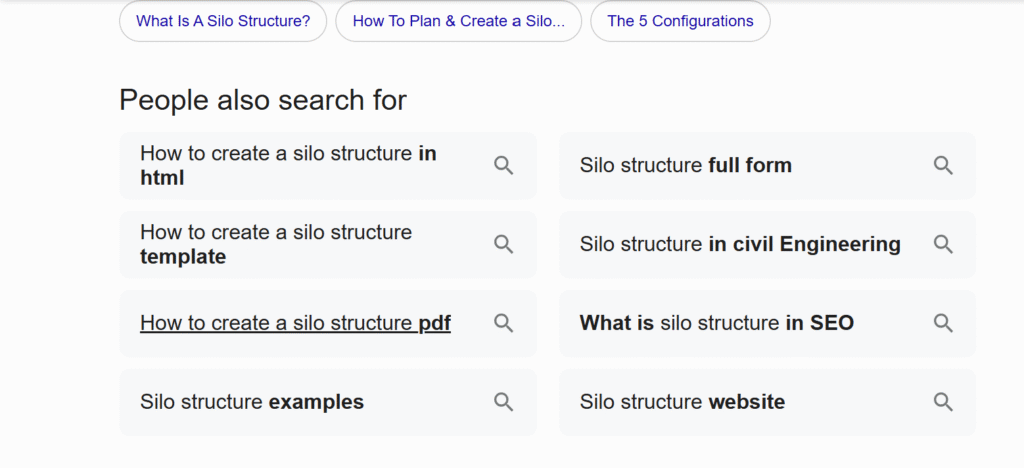
You can click on any of them, see more topics, and add more of them to your blog post. This way, do manual research and cover as many topics as you can in 1 blog post.
4. Using An SEO Tool:
After you have researched your keywords and seen how your competitors write content, start writing your blog post by going to post> add new > start typing, use an SEO plugin like RankMath SEO or Yoast SEO, or even All In One SEO.
5. Writing A Hook:
Start by adding a hook, like factful data, or by adding relevant information, asking a question, to make the audience read more.
This is often ignored by beginners and even intermediate bloggers, i don’t know why.
6. Introduction: Write A Clear Introduction, and explain everything that’s needed here, try to be precise.
7. Body:
This involves writing the core/main part of your blog, add the entire content you researched/want to write, make you answer everything the user wants to know.
Body involves writing the best possible information in the structured format.
8. Conclusion:
Write a powerful conclusion that no one wants to miss, this is crucial since many people nowadays never read the entire blog; they simply skim through the article, and go to read the conclusion.
9. CTA:
Let audience take an actionable step, like purchasing something, or ask a question that they can answer in comments, to improve engagement.
Many beginners and intermediate bloggers follow the same structure as I just proposed above, but advanced bloggers take it to the next level.
Advanced bloggers: They add a strong hook + facts, they even add infographics, social proof, real life data, and multimedia to attract the audience and improve engagement rate.
10. Schema Markup
Another thing is Schema Markup, and it helps search engines to understand what your content is about. sometimes, you can see ratings on Google, or videos, e-books, or a blog post too, everything is a schema in itself, choose whatever is related to your content.
11. Title, Meta & Description
Make sure you optimize your title, meta and description (these 2 are what you see below a title after you search something on Google). ,
My Story On Writing Amazing Blog Posts (Continued)
I have always loved writing blog posts. I have written 200+ blog posts over time and realized I have always followed a writing style.
Yes, this is where I finally excelled. 🙂 My tone is informal, friendly, and some more. I used to write in list form initially, then news style, and currently personalized tone. This helped m to write focused, amazing content and got 4000+ comments on my blogs over the years.
Step 9: Understand SEO + Email Marketing
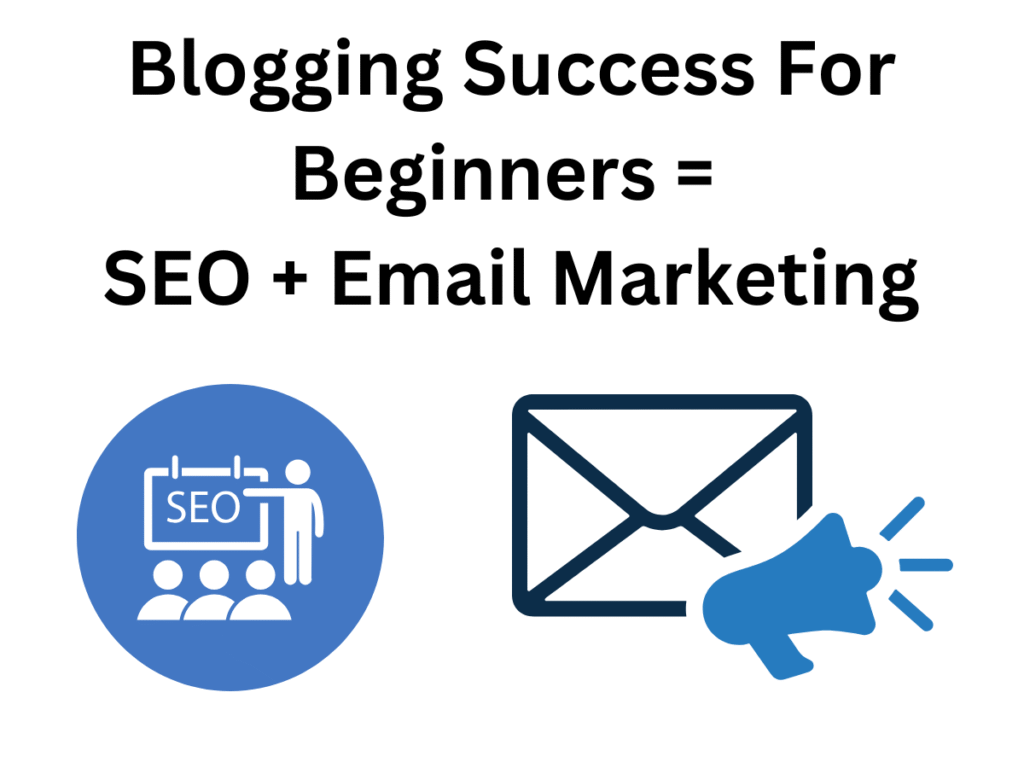
SEO means Search Engine Optimization, and it helps us to organize our content and website in a way so that search engines like Google can understand our website, come to our website, crawl it, visitors can navigate easily, and we can earn decent traffic with money.
What is the definition and deep understanding of SEO and email marketing?
What Is SEO?
SEO, in simple terms, is improving a website’s visibility in search engines like Google, Bing, Yahoo, and helping your website to get discovered by visitors, rank higher, get more traffic, and revenue.
What Is On-Page SEO?
On-Page SEO means improving websites’ performance, and this is controlled by us. It involves optimizing internal linking, improving site structure, optimizing content (using plugins like RankMath, optimizing images, and speeding up the website.
It is helpful in improving organic traffic, allowing us to improve our content.
What Is Off-Page SEO?
Off-Page SEO simply means optimizing our website’s performance, but it’s based outside our website, and we have little control over it.
Off-page SEO involves creating backlinks, guest posting, promoting content outside our website, improving the website’s credibility, authority, trust, influencer outreach, brand citations, mentions, and amazing online reviews.
What Is Email Marketing?
Email marketing is a simple way to attract an audience by capturing their emails and sending them our content, promotions in order to get more engagement and sales.
Understanding SEO is not easy; it takes months, and even years to understand the basics of SEO, continue writing blogs and keep optimizing your website to understand how SEO works.
3 Best SEO Plugins To Consider:
- RankMath SEO
- Yoast SEO
- All In One SEO
Email marketing requires dedicated time, effort, and there are multiple email marketing platform that provides free plans, and then you can scale once you reach limits. You can check the features and decide accordingly which one suits you.
Some of the Best E-mail Marketing Software are:
- MailChimp
- MailerLite
- Omnisend
- CovertKit
You can send 1-2 emails per week by running a campaign and adding more subscribers to your list by adding informative content.
My Story On SEO & Email Marketing (Continued)
It took me years to understand the core understanding of SEO, and it’s an ever-evolving topic, so we all will always learn and update with the algorithm changes. SEO is the fundamental part of the website that helped me grow my multiple websites, reach new people, and get good results.
I always followed white hat SEO right from the beginning, never cheated the algorithm and getting benefits too.
Email marketing is where I somehow lack. I am always learning and evolving. I never truly focused on email marketing initially, but later realized that email marketing is powerful like social media marketing.
Even if social media accounts gets closed or banned, we still can have our followers via their Email. Its that strong.
Step 10: Follow Social Media Marketing & Optimization
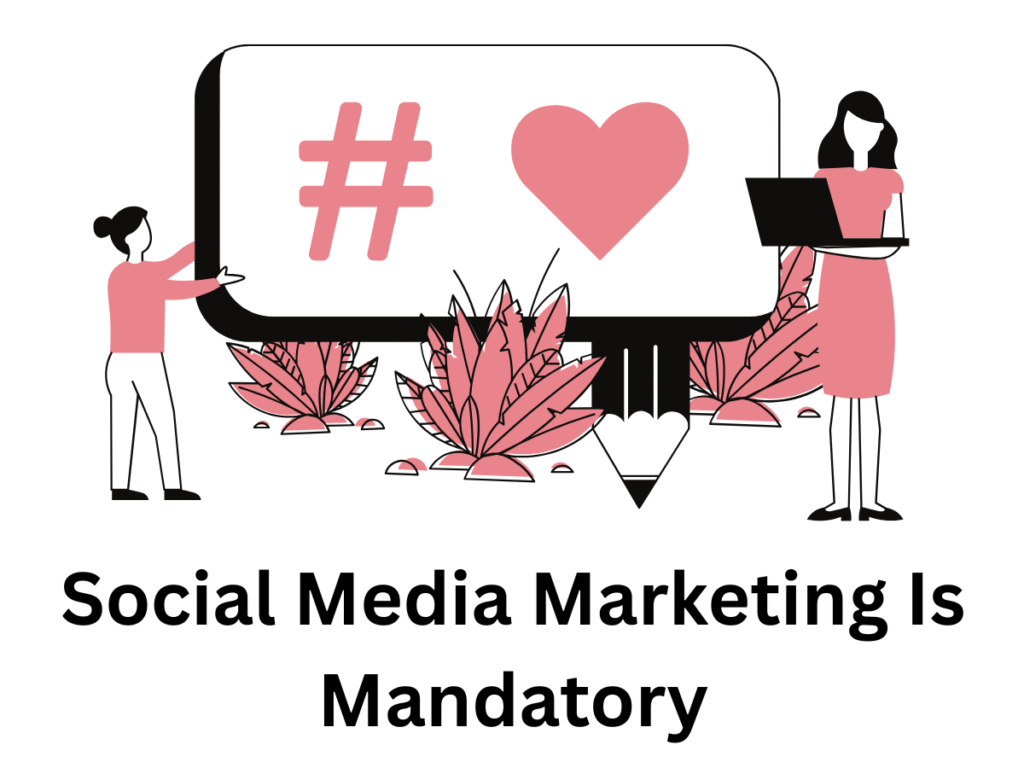
Most beginners never do this properly, even experienced bloggers lack this social media marketing quality and suffer later.
This is extremely crucial, and it’s because even if you write an amazing blog post, it doesn’t matter if no one finds it online, right?
Social media marketing enables the power to you to attract real visitors to your website.
What Is Social Media Marketing?
Social media marketing in simple terms is all about optimizing your content for different social media platforms to raise brand awareness, add unique content, get engagement, drive unique views, leads, and then revenue.
Social media marketing optimization is all about making sure your content attracts potential visitors/clients who can serve you better results, and they themselves are able to solve their problems via your content.
There are multiple social media marketing platforms, each requires different strategies like:
- YouTube (Publish 2 shorts and 1 long form video a week)
- LinkedIn (Publish 1 video and 2 posts/week)
- Instagram (post daily)
- Facebook (participate in groups)
- Pinterest (add beautiful images and get clicks)
- Reddit (answer properly, never spam links)
- Quora ((answer properly, never spam links, they are strict)
- Medium, and many more
You can learn more by adding content on these platforms and tracking your competitors, how they write and publish content.
If you are thinking, how to start a blog for free, then start with LinkedIn, and then make a website, you don’t need a website always to make money online, if you are eager to know how to start a blog and make money then start with blogger, LinkedIn, else buy hosting, and write content, share, and earn money.
My Story On Social Media Marketing (Continued)
Initially i only used WhatsApp, Facebook to share my content with my friends and family.
I realized over time that social media marketing is a big industry. I now share on multiple platforms, and craft content for each one differently. This helps me get good traffic over time and build a trustworthy online community.
Step 11: Learn How To Monetize Your Blog (Optional)
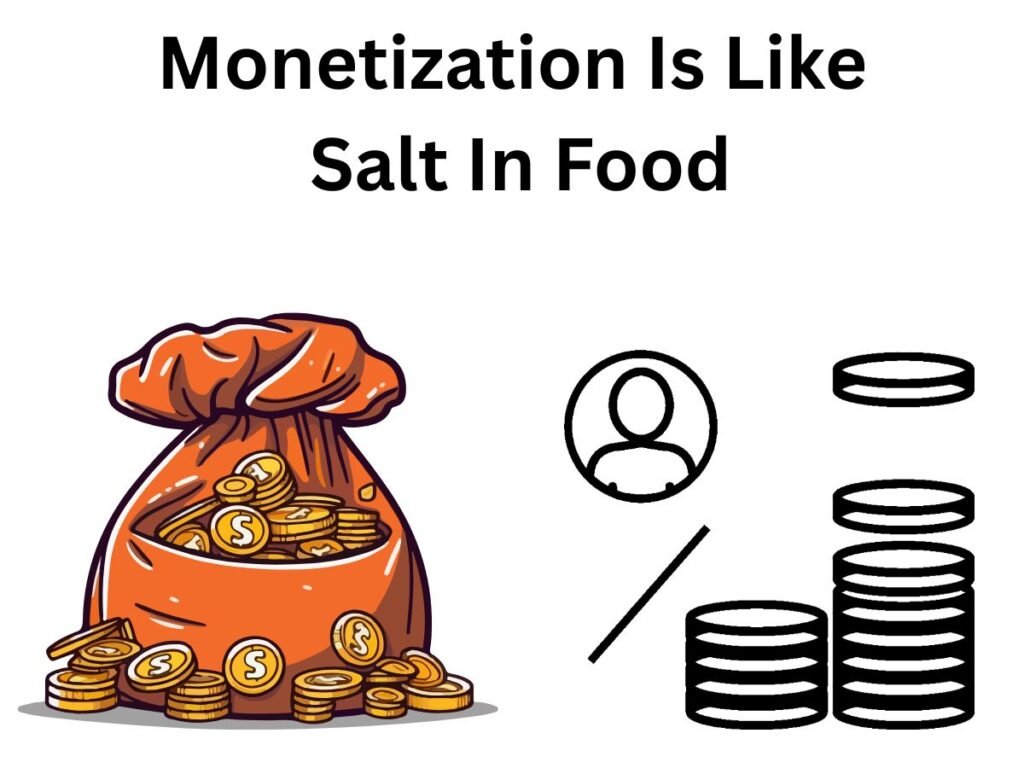
If you are running a blog as private diary or as a hobby, there are chances you will never monetize your blog, if you are serious, then only you can think more about it.
Here are some potential monetization options to monetize your website:
- Ads
- Affiliate Marketing
- Sponsorships
- Listing Products
- Selling E-Commerce Products
- Promoting E-Books For Quick Money
- Services
- Memberships
- Launching Courses
- Freelancing, and much more
1. Ads
True Fact: Probably one of the biggest hurdle for beginners. They never even go for other options, all they want is ads monetized, and when that doesn’t happen, they quit blogging.
Platforms, like Google Adsense, Ezoic, allow us to apply for their program, and in return they help us to display ads on our website, and we earn money, they take some percentage for sure and we get the rest of the revenue.
How to make sure you get ads on your website and get approved by various ad companies?
How Do I Get Adsense Approval?
To get your website AdSense approved or other platform approved, make sure you follow this list:
You must be 18 Years Old
Avoid low-value content
Post Original Content
Never copy others’ blogs
Avoid AI-written content
Do proper silo-structure
Add relevant keywords
Avoid Keywords stuffing
Never spam
User-Friendly Design
Improve Speed Of Your Website
Avoid Black Hat SEO practices & adapt White Hat SEO practices from the beginning, and gain an advantage
Write 20-30 blogs/category
Add mandatory important pages in your website like Home, About, Contact, Privacy, Disclaimer, Terms & Conditions
Cookie Policy/cookie plugin, comply with GDPR guidelines/policies, make your website friendly, safe, and secure
SEO optimization
Make sure your website reaches at least 1000-10000 visitors/month – this can seriously give you advantage over your competitors, you’ll win.
2. Affiliate Marketing
Affiliate marketing means promoting other people’s products, and in return making a commission out of it.
Example: Amazon affiliate marketing, impact.com, register there, promote relevant products, and earn commissions. Software affiliate programs can even give you more than 50% commissions in some cases; it’s worth it.
It is one of the most loyal, effective ways to earn money today, far more profitable than ads many times.
3. Sponsorships
Once you become famous or attract decent traffic, you may start receiving sponsorships from companies to promote their product/content/service for amazing money, but don’t promote anything; be loyal to your audience.
4. Listing Products
List products on your website, and earn money. its simple, effective.
5. Selling E-Commerce Products
E-commerce websites are trending nowadays and selling products is a great way to earn money.
What Is An E-Commerce Website?
It’s an online platform, an online website where personal brands/businesses sell their goods and services, and make good money. E-commerce websites are gaining popularity.
Use Shopify, WordPress to make an E-Commerce website.
First, learn how to start a blog, then learn how to start a WordPress website, and then create an E-Commerce Website. E-commerce websites can help you add content, monetize quickly, add products in your shop page, and earn money.
You can even create a multi-vendor E-Commerce website, using a plugin like Dokan, and here you can allow vendors to create their shop, add products, and list them online. You can earn a commission for every sale.
It’s like Amazon, Etsy, DoorDash, Flipkart, etc., you can make it via WordPress too, just install Dokan.
Important Valuable Multi-Vendor E-Commerce Website Dream Domain
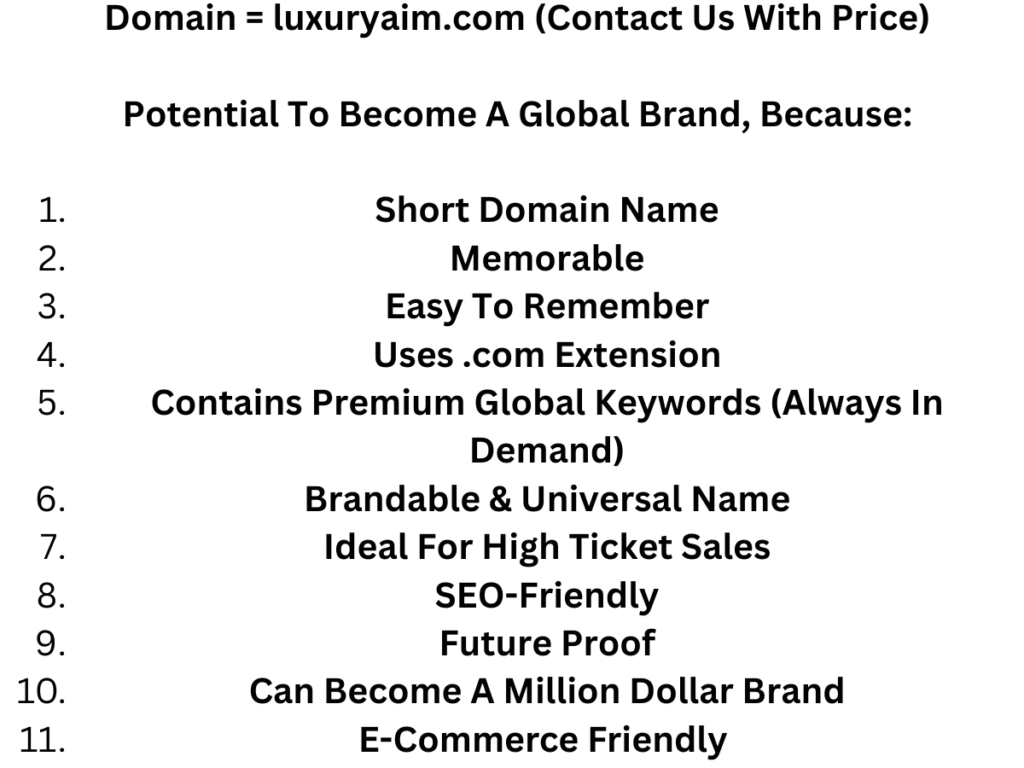
I do have a premium domain that can become a global brand, its worthy, short, memorable, and uses .com extension.
You can never find such a domain. If you seriously need this, I can sell it. Email me if you seriously want to build your multi-vendor website or a simple E-Commerce website in any niche, specifically the luxury niche.
Sell high end luxury products like luxury watches, luxury home decor, Jewellery, and much more.
The domain name is luxuryaim.com
It can change your life. I am focusing on other projects, so I cannot work with this, but if you want to become a brand, global brand, consider this domain. It already has a keyword, is extremely SEO-friendly.
6. Promoting E-Books For Quick Money
Write E-Books, sell and earn money, that’s simple.
7. Services
If your company or you can deliver services, provide services, you can make money.
8. Memberships
If you have content, like a news website, hide premium articles, and charge money for them as membership fees.
9. Launching Courses
Launch courses, earn awesome money, it’s helpful.
10. Freelancing, and much more
Start freelancing, sell your skills, and earn money.
My Story On Monetizing My WordPress Website (Continued)
I monetized my blogger account first via AdSense, and later my WordPress websites via AdSense.
I later realized the money growth was slow, and I discovered new ways to earn money. I started affiliate marketing, and earned decent money, I even allowed people to write on my blogs, sometimes got offered too.
By reading my blogs, people even offered me to add a donate button on my website, so that they can support me.
I listed digital products too, along with physical products, as affiliate links, and today I know multiple ways to earn money online.
Do you remember I said in the beginning that if your domain or blogs fail to earn money, or you want to leave blogging, you can still do the same and earn money? Yes, by selling your domain or website in auctions like GoDaddy auction or platforms like SEDO. Yes, it’s a legal (in my country), safe, and fantastic way to convert loss into victory.
Step 12: The Secret Method
The secret method is what all beginners, and even experienced bloggers search for to increase their traffic and revenue and here’s the secret:
“There is no secret method in blogging that can help you to grow quickly; it’s all about your determination, investment of time, effort, money, energy, discipline, honesty, authority, and so on.
If someone claims you can run your entire website, and grow exponentially from Day 1, either the person has hacked the algorithm, or the person is lying without fear.
The truth is, you can see some traction with some techniques, but in reality, there is no secret whatsoever.
Don’t have any money to invest? Starting From 0?
Don’t worry, as I will still help you so that you will understand everything clearly and later you never have to search again on Google about how to start a blog for free, trust me, it’s a great way to analyze and test the platform, but it’s not for everyone. Folow everything mentioned in the blog post.
If you skipped the entire blog, to read this section, well, there is no secret, it’s all hard work, I hardly lie, it’s the truth. To start a blog for free, use free blogging platforms, and follow the steps of this blog post to unlock your potential on how to start a blog and make money online.
This Is Where People Make Mistake For Freebies & Gets Stuck In Loophole
Remember, a blog is an asset, a website is an asset. If you have some money to invest, you must invest it to get good returns for your lifetime. Don’t think twice again and again about this; investment is mandatory at every stage of your life.
My Story On Learning The Secret Method (Continued)
This is how many bloggers and YouTubers made a joke out of the industry/ they fool people to earn money and views, and the reason why many quit blogging. Surely, there are some strategies to speed up the processes, but there is no secret method.
I learned this the hard way by wasting time, money, power, and my determination, discipline, and lost willpower at times, but never giving up is my attitude in the world of blogging.
I always say the same: start blogging, keep going, keep doing it, there is no shortcut with this whatsoever. There is hard work + smart work.
Important FAQs On How To Start A Blog
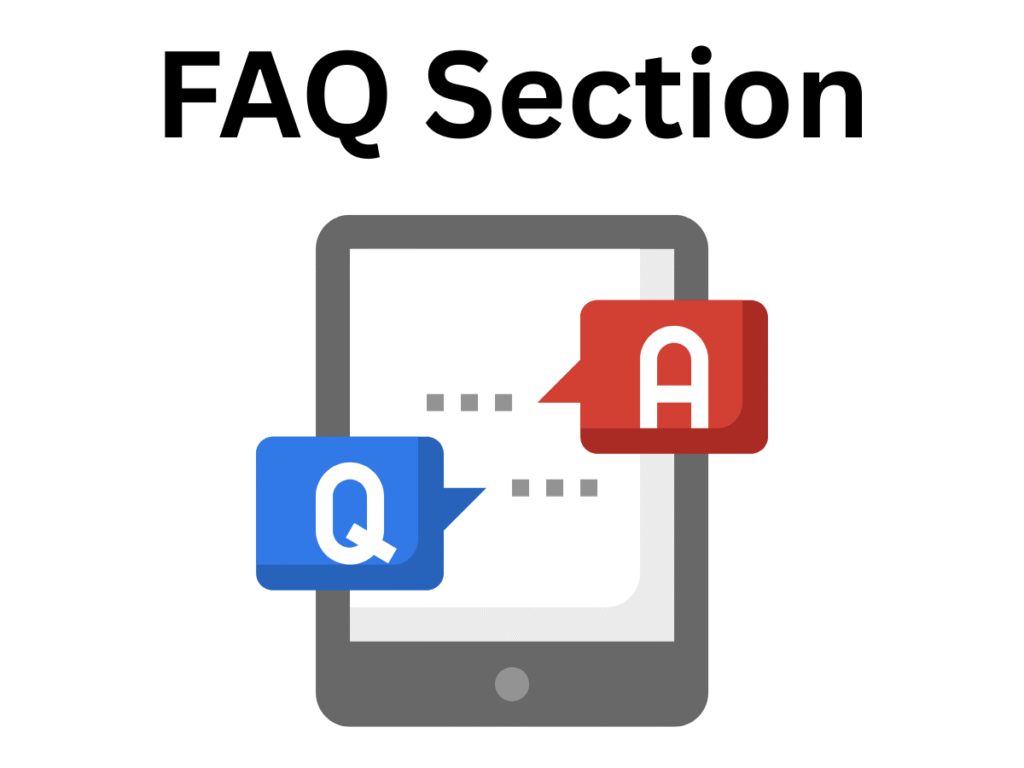
How To Start Blogging As A Beginner?
To start blogging as a beginner today, there are multiple things to consider, and you have to follow and consider these 16 basic steps:
1. Selecting a lucrative niche
2. Buying a Proper hosting and domain name
3. Website setup followed by a website design
4. Focus on search intent
5. Maintaining the speed of your website
6. Do enhanced Keyword research
7. Practice SEO daily and consistently, and on your website, apply the On-Page SEO, Off-Page SEO, and Technical SEO
8. Adapt with Email marketing
9. Learning social media marketing
10. Building Consistent Traffic
11. Improving Engagement rate, bounce rate
12. Growing Your Backlinks
13. Using AI Smartly
14. Focusing on content promotion and PPC, and
15. Enabling Monetization, and
16. Many more Digital marketing strategies
These are just a general overview, when you start building your website and writing blog, and relevant content, you need to do all the steps again and again, consistently for months, and years to see minimal traction, and later on consistent growth.
Is There A Future In Blogging?
Yes, the future of blogging is stable, and as long as the Internet is there, people will search for information, and that is provided by bloggers via blogs. So, blogging is not going anywhere. Write from your heart, and enjoy the content you publish.
Is There A Difference Between Domain And Hosting?
Yes, the domain is the address of your website, while web hosting stores data of your website files, provides you with rented space on the Internet so that you can showcase what you offer to the world.
Do Bloggers Earn Money?
Yes, bloggers earn money from various monetization sources like ads, affiliate marketing, selling products, services, and more, but it takes a lot of time, effort, money, and energy to make a blog website successful.
Beginner bloggers can start earning a little after a few months, while experienced and established bloggers can even earn 5-6 figures/month, probably even more, but it’s really tough, not easy for everyone.
Is Semrush Free?
Yes, Semrush offers an amazing free plan, but it comes with limitations. you can use it to do keyword research, keyword overview, backlink audits, and many more related tools. If you start a 14-day trial, then you can see the power of SEMrush.
It is literally one of the best keyword research tools in the market today, industry standard.
Is Ahrefs Free?
While it’s not totally free, you can use free tools like the Ahrefs Webmaster Tools, and even generate keywords of your choice.
Key Takeaways
- Start Now, Don’t wait for the Perfect moment, make this your moment
- You Will Learn how to start a WordPress website Practically (step-by-step, most detailed updated practical guide on the Internet today)
- Use the CASH Formula and EPIC Formula to choose domain and niche, brainstorm the answers for the 16 questions, before that, never move onto step 2
- Always choose a broad niche, but start with the narrow niche
- Silo-structure is crucial for blogging success
- Never publish AI-generated content, add a human touch
- Learn social media marketing and adapt omnimarketing approach
- Email marketing is not an option, its a mandatory choice
- You cannot avoid Keyword Research for the best results
- Monetize when you have checked all the points mentioned in the monetization section practically.
How To Launch Your Website Live In 1-2 Hours
To do this practically, you have to first select a niche, and domain, then only its possible – don’t rush, take your time, now after its done within 1-2 hours your website should be ready and live in front of the world 🙂
- Choose Hosting, eg: Hostinger & buy any plan: 10-15 minutes
- Setup Your Website: 30 min-40 minutes
- Manage and customize your theme: 20 min-40 minutes
- Create Important Pages: 10 min-20 minutes
Now, start writing your first blog post, all the best 🙂
Conclusion On How To Start A Blog
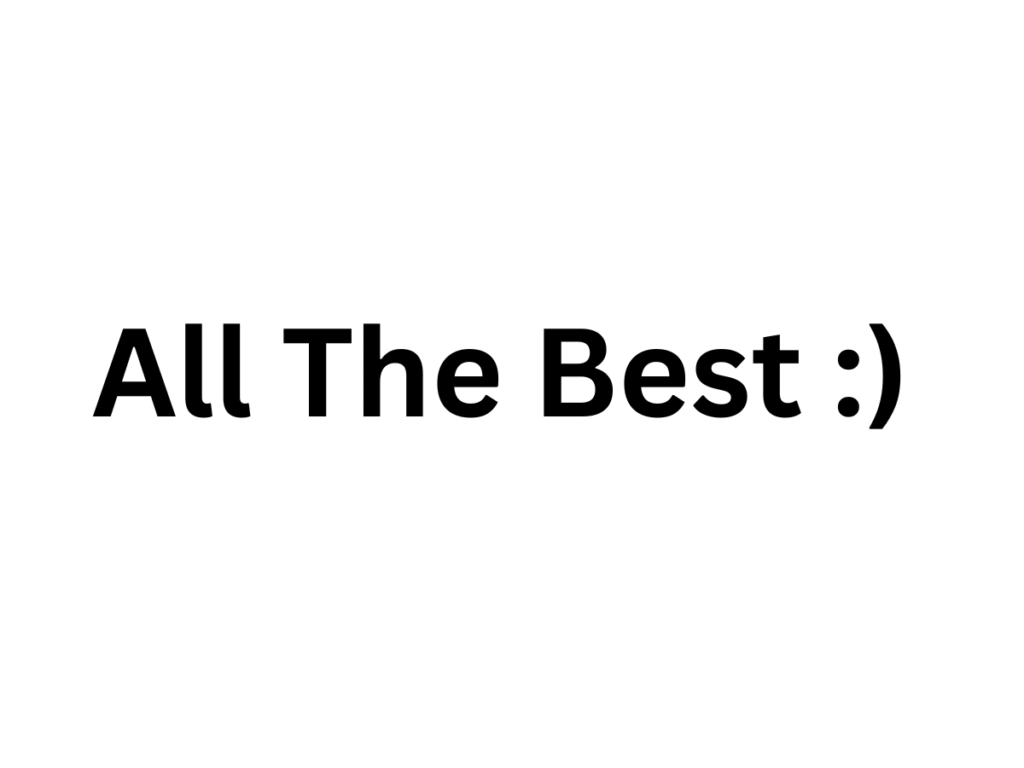
If you are still confused about how to start a blog, then remember, there is no magic trick, you have to follow the hard work, and then smart work.
Now, you have everything to get started. First, pick a niche, domain, blogging platform, hosting, design your website, write blogs, share, and earn money, and build your online business 🙂
You are no longer starting from scratch; you are starting from clarity and step-by-step guidance.
Don’t Delay, Never wait for the perfect moment, make this your moment, learning how to start a blog takes time, take your time, learn it, learn everything slowly, one at a time, but start doing it.
First 100 days are important, stay consistent, learn, apply, and grow.
If you have any questions, contact me via the contact form or drop a comment down below. I’ll answer your queries down below. If you think this changed your life, cleared your doubts, then please share this blog post.
Its even bigger than an E-book and story books, and I took a lot of time, gave my unbiased opinion, and shared my experience 🙂
This entire blog post is more than the size of short story books, and E-Books. I took a lot of time, crafting this, it is more than 15000 words and will help you with everything you need. If you still have questions, ask me the question, I will wait for your reviews too 🙂
So, which platform will you choose to start your journey? Which theme did you love the most? Did you learned something new? Answer me down below 🙂

With 7 years of blogging experience and I have worked on multiple niche and now I want to make sure I share what I learned over the years and master Digital Marketing and Blogging for the Future in this AI World.
I hold a masters degree in Climate sciences and policy and bachelors in Environmental Sciences and I’ll make sure you will get authentic, original, fresh, data-backed content.
I’ve dedicated myself to blogging with authenticity, honesty, transparency, depth, and purpose — not chasing trends, biasness or opinions, but sharing truth-based insights, timeless knowledge, and fact-rooted research that can empower lives across generations.
TimelessAim.com is not just a blog or a business.
It is the soul’s mission — to serve the world through truth, wisdom, honesty, right knowledge and educate people about the online world through latest digital marketing information.
Every single blog, article, tool, and project is built to share authentic, unfiltered real knowledge. Restore trust in information for all.
Building a legacy, an empire that starts with selfless truth and ends in global upliftment, helpful for everyone.
When information becomes sacred, the world totally transforms – Its True.
That’s the aim — and that’s the promise of TimelessAim 🙂


This is the most practical and detailed guide I have read on how to start a blog, thank you so much 🙂
It’s so unbiased and honest, loved it! I have bookmarked this website 🙂
TimelessAim, waiting for more blogs.
Thank you so much for this lovely comment 🙂 I hope you will be able to start and run your blog successfully 🙂
All the best 🙂
Thanks a lot 🙂
Very well researched article.
Well done
Thank you so much 🙂
Very Knowledgeable…interesting…important article,very well done,keep it up,it shows your hard work…determination,dedication…
Thank you so much, it means a lot 🙂
I came from reddit to see your website as I am into this myself and found a lot of useful information.
Keep up the good work.
Hey, thanks a lot 🙂
This post reminded me why following you was one of my best decisions ever 🌈
This means a lot 🙂 Thanks